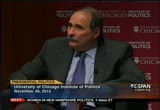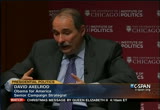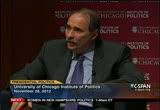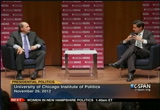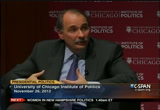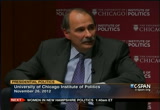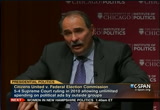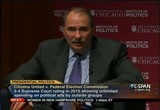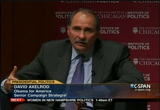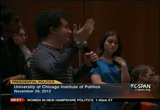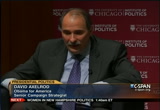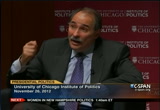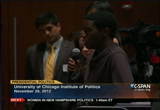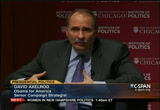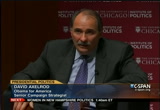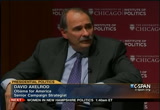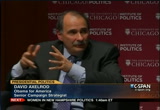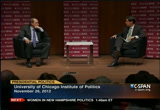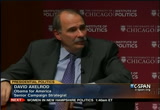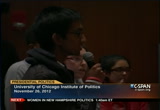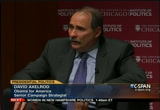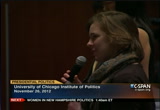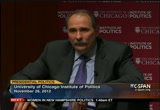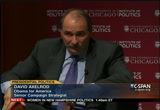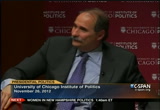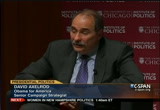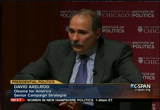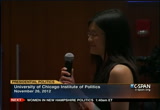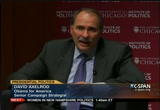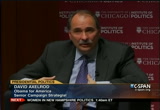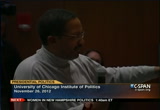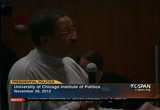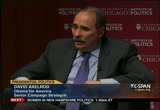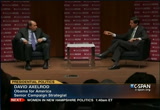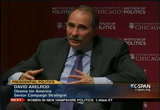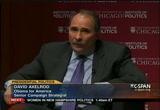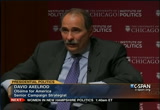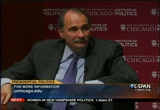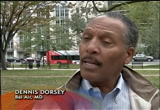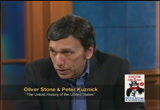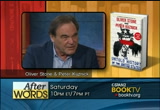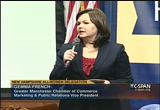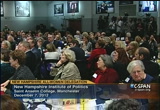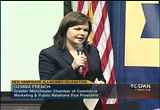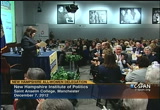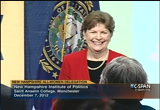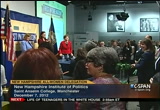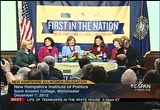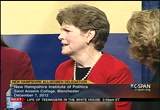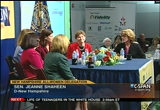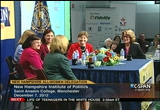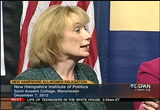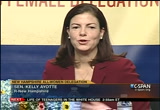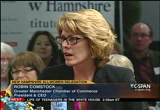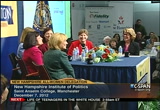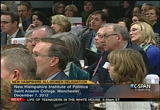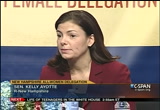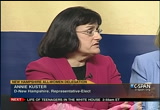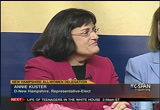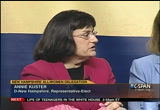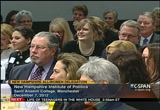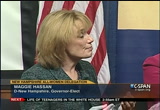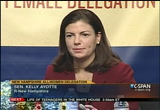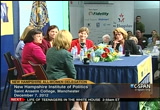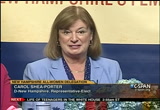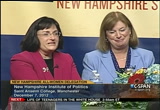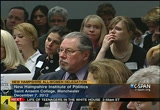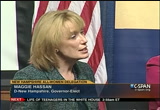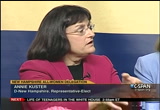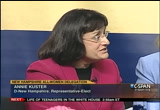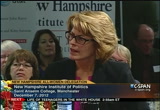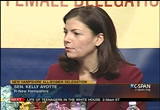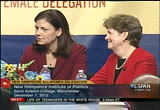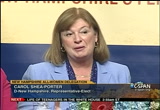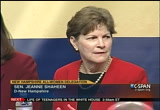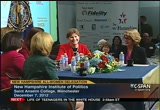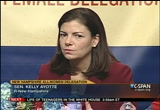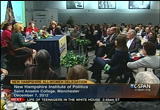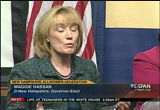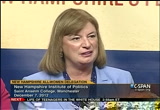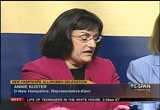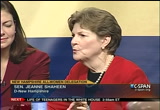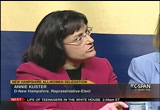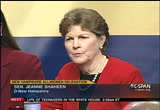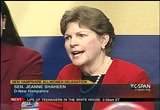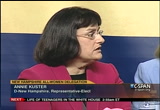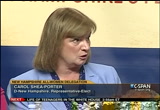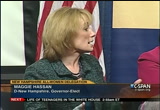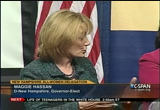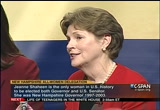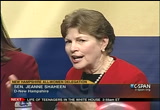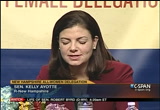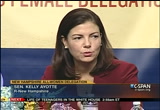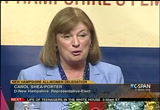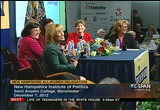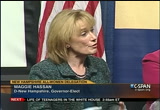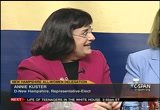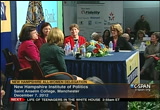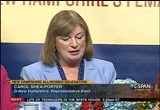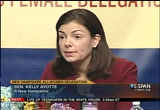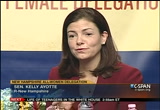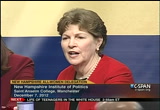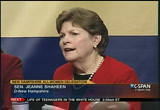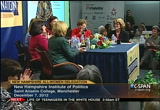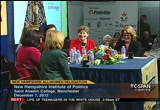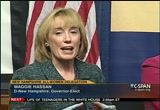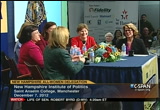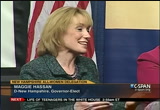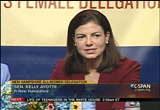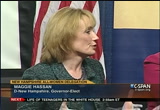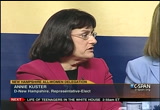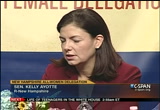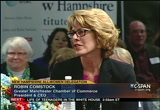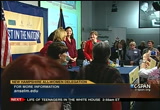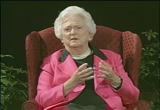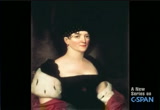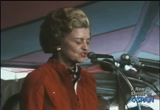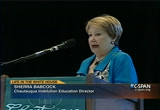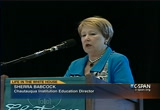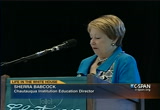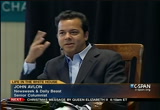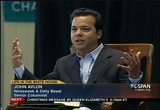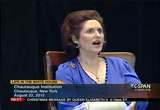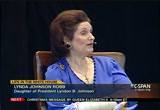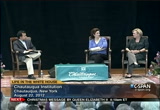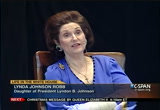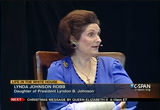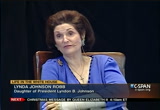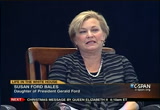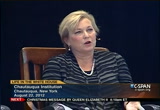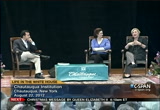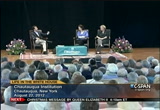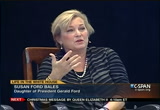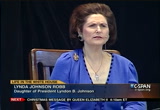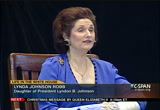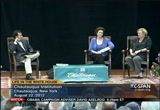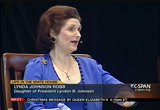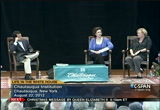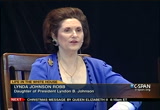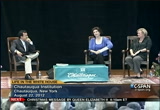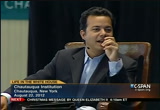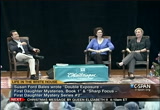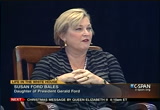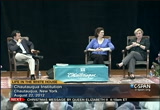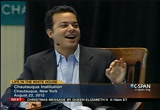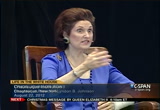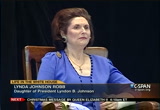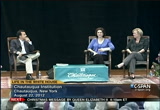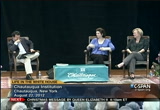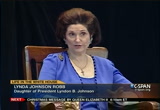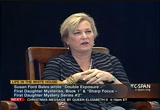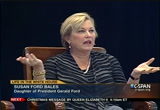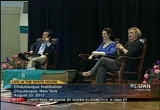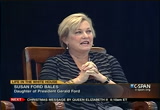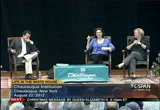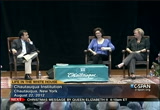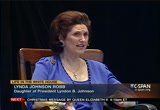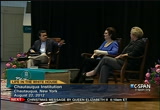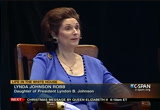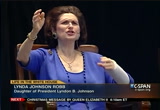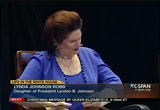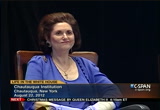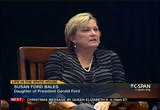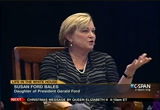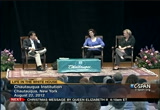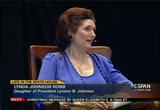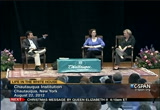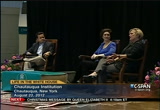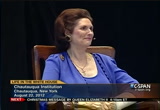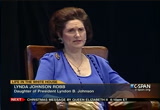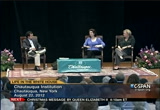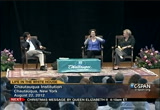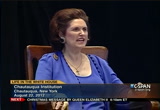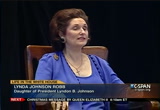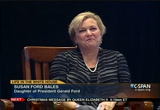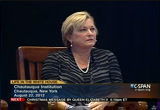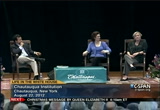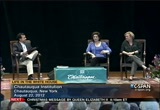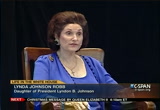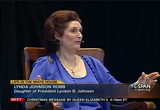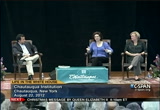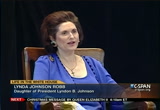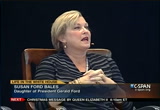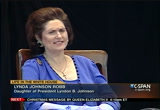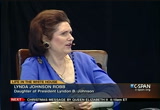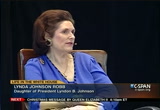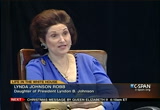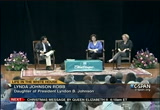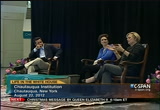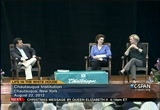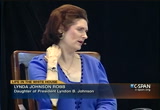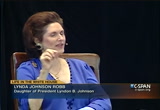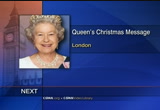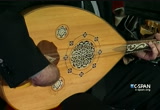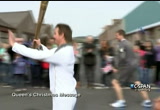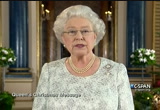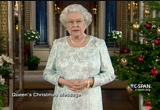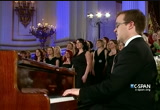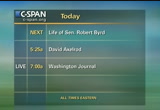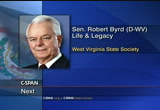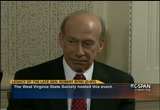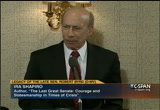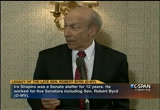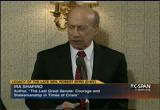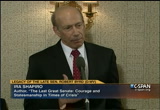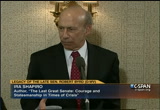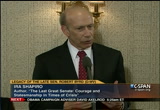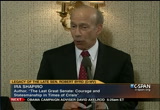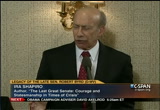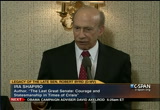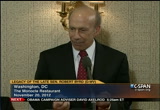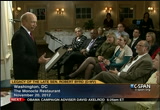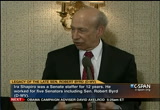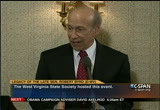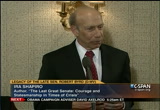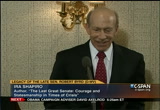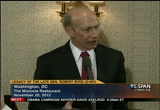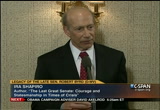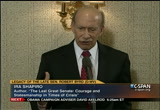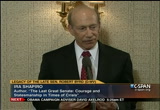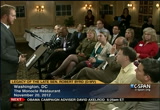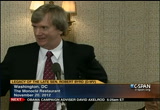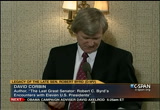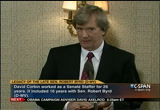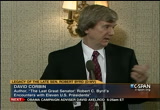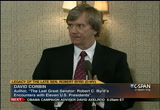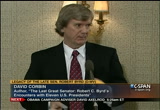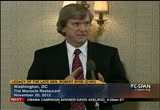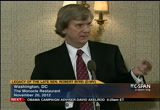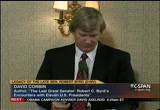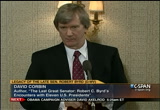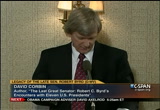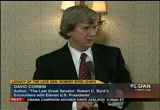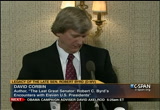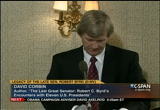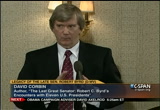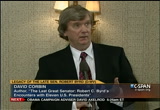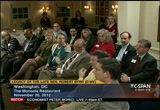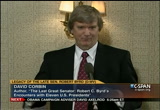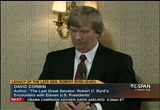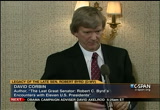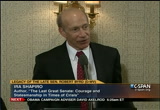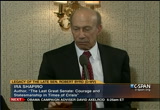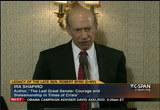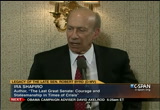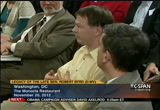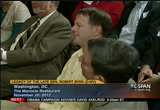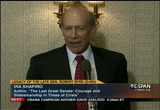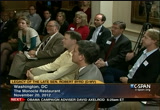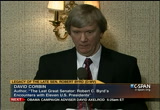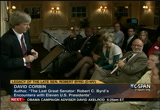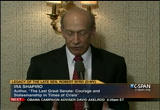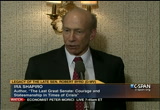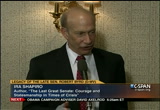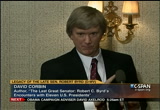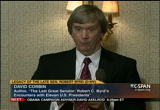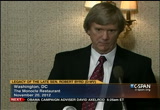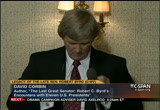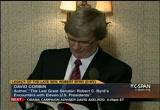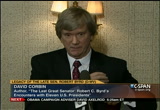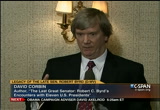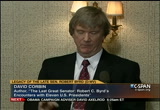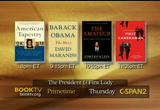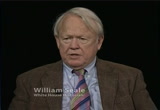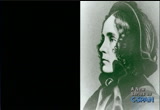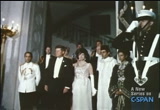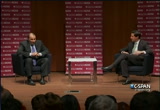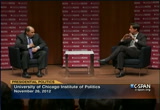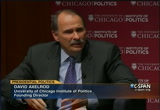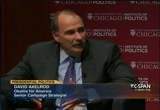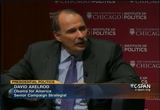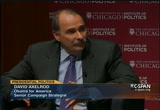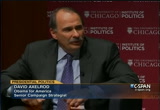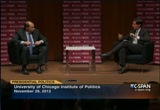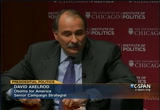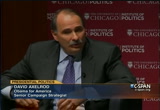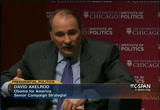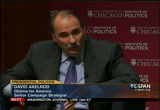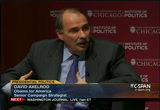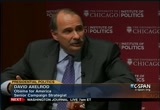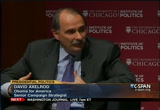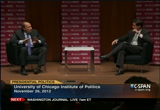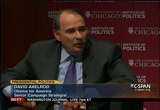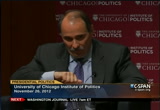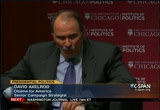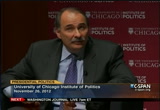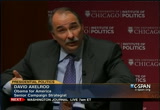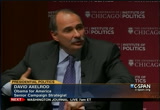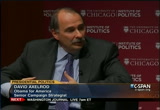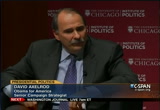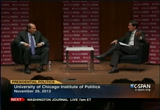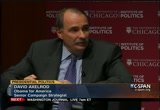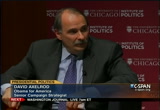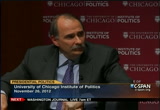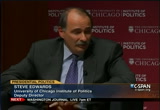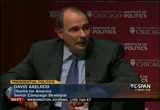tv Capitol Hill Hearings CSPAN December 26, 2012 1:00am-6:00am EST
1:00 am
i thought tim pawlenty. running in these national races is really hard. i remember the day that -- we were leaving denver after the convention and we learned that, on the airplane, mccain had chosen sarah palin. so went to the front of the airplane to senator obama and senator biden had been newly selected as his running mate. he said i think i am reasonably smart. it took me like six months to figure out how to be a
1:01 am
presidential candidate, how to deal with the stop light, how to -- spotlight, how to deal with the national politics. she may be the smartest politician ever and she may be able to come out of alaska to handle all of this. but i will give her three weeks. three weeks, we'll know if this is real. three weeks to the day, she did her interview with katie couric, which effectively ended it for her. i thought they might make -- [laughter] i thought that they might make a conservative choice, someone who had at least a taste of the national stage or, which was more of a consensus in the political committee, that he might take rob portman from ohio because ohio is so important. portman was a guy who is a center-right conservative, who might be more broad.
1:02 am
i think barack was surprised by the choice. >> do you think portman could have changed the outcome? >> i don't know. there is a lot of reflection on that in romneyland. >> when you were talking about the adjustment that obama felt he had to undergo, and tell me what are the difficult things? >> what is different is the intense relentless scrutiny. remember, most candidates get to begin with very little press or no press in rooms of tender 12.
1:03 am
he can -- of 10 or 12. he opened up right on broadway. and all of the reviewers were in the front row on the first day. as he was developing his chops as a presidential candidate, they were already evaluating. if you look at the first four months to five months of the primerica made it was very negative. he was underperforming. he was overrated. >> there was a lot of critique in the first stage. >> yes. they were bad. he said at the time, i am not a good candidate, but i will become one. i will learn to become a good candidate and he challenged himself. >> and all of your experience with candidates, what are the intangibles that candidates need to separate?
1:04 am
>> i think authenticity. i thought about the sale lot when i was watching the other campaign. george burns used to joke that all you need to succeed in show business is sincerity. and if you can fake that, you got it made. [laughter] i think genuine authenticity is important, especially in a presidential candidacy. and barack obama is very authentic. that undergirded us in many ways, and even in this campaign. people felt comfortable with who he was. they were not going to be surprised by him. they knew what drove him. and they felt comfortable. >> another question from this side. >> after a the citizens united
1:05 am
supreme court decision, there was a lot of worry about the effect this would have on campaigns, especially with the effect of super donors giving millions and millions of dollars to one campaign. i was wondering to what extent did super pacs affect both sides? are those fears -- how founded are they? how much have they come to light? i am wondering about your views in general. >> the thing to be hopeful about is that a billion dollars or so were spent and then a billion more on the wrong side. and we were able to win. hundreds of millions of dollars were spent against democratic candidates by some of these big republican super pacs. there were democratic super pacs as well.
1:06 am
the money was spent on their side. almost all of their targets, almost all the candidates lost. i do not think that money -- that put enormous pressure on the democrat -- democratic candidates and super pac's to match it. it was more so in congressional races -- people gave less information and were more subject to being influenced by ads. we saw some races -- quite a bit of money was spent against bill foster. he won overwhelmingly. $6 million of super pac money was spent against him. tammy duckworth in her race -- she was still able to win.
1:07 am
i do not think it is a healthy thing for the body politic to have people writing $10 million, $20 million, $30 million, $40 million checks. but it is a reality we may have to live with if we cannot change it. we should try and change it through whatever means are appropriate or available. the supreme court -- the supreme court changes over time, they may want to evaluate some of this. so i am heartened by the fact that we were able to overcome it in this election. i worry about the future. not every candidate will have the particular advantages barack obama that had in his ability to raise money.
1:08 am
>> another question from this side? >> there seems to be a growing consensus or perception that, unlike past democratic president, president obama has not left a ideological format of what it means to be a democrat. there is -- there has been a fear that with the party going so big and republicans moving to the right, there could be a battle for the soul of the party in the next four or eight years. do you see a post-obama age -- a civil war-like occasion happening? >> we just pushed the post-obama age off by four years. [laughter] >> i know. even in the next four years? >> what this president stands
1:09 am
for -- i talked earlier about the fight we had. i was reading a book some of you may have read that was excellent about clarence darrow. he talked about some of the fights in the late 19th and early 20th centuries. during the gilded age and the progressive era. so much of the dialogue -- there were differences, but the fundamental philosophical debate was very much the same way we had in this election. do we believe that the strength of our country and the economy comes from a broad number of people, the middle class, those working to get into the middle class, or do we believe it comes from the wealth- generating capacity of those at the top? this has been a longstanding debate, and i think it was very vital in this election.
1:10 am
president obama can carry the banner high and proudly and well. the things he has done, whether it is health reform or education reform, making higher education more affordable, expanding pell grants, creating the consumer financial protection bureau. they are all aimed at one thing -- to create a economy in which we have a vital middle-class and our tax policy reflects that as well. opportunity is broadly available. i think that is solidly in the mainstream of the democratic party. we can have a debate about means of achieving that, and i think we have to do some soul- searching about how in the 21st century we achieve those goals,
1:11 am
and whether all the avenues and pathways that made sense 50 and 60 and 70 years ago are still valid today. many of them may be -- some may not. on the fundamental goals, he is solidly in the position of the democratic party, solidly progressive. i think that is a lot of what the election was about. >> in this election it has been observed that much of the advertising was predominantly negative. i would like to ask -- i know both sides of campaigns engaged in this. including an obama at that scene to insinuate that a woman -- bain as responsible for a woman losing her insurance and somehow causing her death. ads like that seem to degrade
1:12 am
the whole political process. i wanted your comments on negative advertising. >> i agree that there are ads that degrade the political process. i saw many of them in the last campaign. many of them aimed at us. on that particular ad, that was not from the obama campaign. that was from the super pac. we made clear that we did not think that was appropriate to accuse romney of somehow being responsible for that woman's death. it was inappropriate. i should point out that that ad ran exactly one time in this whole big country. partly, i suppose, because we made at disapprobation known publicly. were there legitimate issues about bain and romney's business practices? i really believe there were, and it goes to the larger debate.
1:13 am
if you outsource jobs and cut benefits and destroy pensions -- profit off of bankruptcy's well workers lose their pensions and their jobs and benefits, is that a -- it may be a good practice for you. is it a good policy for the country? no. there were legitimate issues, but that was not one of them. that was not an appropriate ad. but look -- to your broader question, this was a very tough election. it was tough on both sides. romney, more than 90% of ads run in the primary were negative. he did not change his habits. so we had to make a case as well. we spend a lot of time and money, especially during the key
1:14 am
period, really trying to define romney. we did. just to get the sequence -- we spent a month in the battleground states running positive advertising about the president. that is how we began our media campaign. >> the thinking they're being -- shore up the narrative and the accomplishments. >> yes. we thought we had plenty to share. and we did. but it was clear that if we just allow romney -- the local chamber of commerce president, if that was the image people had, that would not be in our interest and would not focus the race the way it really shed. >> you wanted voters to have -- after experiencing the ads against governor romney -- what
1:15 am
were the things you wanted them to feel? >> basically that he was out of touch with their economic experience and his fundamental view of the economy was not one that incorporates them. but when the 47% take came out it was a ramification of our views. >> he said was the greatest gift -- it reinforce the narrative you were trying to -- >> these kinds of things are either meaningless, like when they tried to spend tens of billions of dollars on the you did not build that thing. it really fell on deaf ears because people did not really believe that was what the president was saying. this tape was not in the
1:16 am
statement -- it was like an essay. his remarks after the election seemed to reinforce that. this was his philosophy. this was his view. that was a fundamentally different view than the president's. we made the case -- we made it on a sustained basis. >> i want to get to more questions from the audience, but let me pull back slightly to the broader question. have you defend the profession. we have talked a lot about the problems of politics. clearly the questionnaire -- questioner alluded to politics. there are many people who say you want to look at particular causes and forces that shaped the climate -- political consultants are one of them.
1:17 am
what is your response to the broad criticism about political consultants being associated with the worst elements of politics as opposed to the best? >> some are. you could do this in a principled way and in an unprincipled way. campaigns are hard. if you read american history, you very quickly realized that our campaigns are not anymore -- they are probably much less brutal than some of the campaigns of the past in american history. but because of the amplification of television, of now the internet, and so on, there is a broadness. if somebody says something in kansas, it goes around the world almost immediately. somebody says something like governor romney did in a roomful of supporters that they thought was an intimate setting, that it ultimately was not. that has changed. look, we have had strongly contested elections throughout our history because there are big things at stake.
1:18 am
if you do your job right, you want to make sure people understand what it is you are fighting for and what it is you are fighting against. so the choice is clear. i think if it goes to the fabrications and -- or worse, then it is something else. >> another question from this side. >> my question is sort of related. do you believe that your campaign and governor romney cost campaign to have a decrease or increase the possibility of bipartisanship in politics? >> i think our campaign has increased the bipartisanship -- is that what you are asking? >> either campaign. >> i do not know whether our campaign or their campaign did
1:19 am
that, but i think the voters did. you can see already, there is a different tone in washington. i think elections matter. the voters spoke. even though the race was relatively close, it was not that close in the electoral college. even the margin has expanded now to 4 million votes. i think people read those results. i think, for example, on an issue like immigration reform, the prospects for passing comprehensive immigration reform in the near future -- near future are much greater than they were three weeks ago because of the result of the election. i think the chance of coming to an agreement on this fiscal cliff are greater today because of this election. politicians read election results.
1:20 am
i do not know whether our campaign or their campaign fostered the environment for that. i think the voters did, and that is as it should be. >> the last couple questions -- we will come back to this side. >> my question is, in the days following the election there was a fair amount of coverage about the divisiveness of the obama for america ground game -- i was wondering, how you need you think that model was for this campaign and candidate, and if this might be the new model, to be replicated -- how is that going to play out in 2016, especially where both candidates will have a contested primary and maybe not the opportunity to set up offices in iowa for a year and a half out from the election? >> the field has always been
1:21 am
important in elections. there was a time when the field meant political organizations did field work. chicago is renowned for fieldwork, only it was done by precinct captains for a long time. fieldwork is important. it is not a substitute -- i liken it to a football game. the message has to get the ball close enough to the goal lines so the field can win the game. you cannot simply win a race with field. but what has happened is the marriage of social media and a traditional field work, so that we can -- we are far more efficient at communicating with people. we registered more voters online this campaign than we registered altogether in the last campaign.
1:22 am
so the technology has made it easier to organize. in a weird way, the technology has made it easier to individualize hour appeal to voters and the dialogue with voters. i think what was done with this campaign was light years ahead of what we did in the last campaign. whoever is in 2016 will have to reinvent it again because the technology changes so rapidly. twitter was nothing four years ago, and look how important it was in this campaign. one other surprise -- i was surprised at how little the republicans invested in the field in their primary campaign. one thing that really benefited us in 2008 was we had a 50- state primary campaign. from the beginning, we were
1:23 am
determined to run a very aggressive and field campaign. we set up operations and all the states -- in all the states. in the battleground states, those organizations sustain themselves. in iowa, that was very important. so i would not, given the nature of the process, at least in those early states, if i were running in 2016 i would not do what was done in the republican race, which is turn it into a media campaign. he will not leave any lasting structure you can build on for the general. >> a question over here? >> i was really excited when president obama came out in favor of gay marriage. it felt like a rest and a hard left, but i was surprised by other issues that i felt the american people cared about
1:24 am
that the candidates were silent on. such as the drug war, climate change, environmentalism -- it took a long time before they talked about afghanistan. i was wondering if there was any rhyme or reason to those issues? >> i challenge you just a little that -- the president talked a lot about afghanistan and made it clear we would withdraw our troops in 2014 and that was something he has probably spent a great deal of time talking about. it was only late in the campaign that governor romney engaged on that, and that became a debate in the campaign. on the issue of climate change, there is no doubt that that is a central challenge for us and the world. the president said in his first campaign and in this campaign. some of the things he has done, doubling fuel efficiency.
1:25 am
the first time we have raised them in 30 years. doubling of renewable energy. these things are some of the changes in environmental law relative to emissions -- they are all part of that effort. we have got to do more. we have to build on that. but it is certainly a commitment. one thing we recognize is that it does not have to be a competition between our economy and our health, because renewable energy and clean energy have economic benefits that are pronounced, and people understand that. so we highlighted the issues we felt needed to be highlighted for voters who are going to make the decision in the election, but the president's agenda is reflected in his work, and i expect he will continue to work hard on this issue is.
1:26 am
>> let's take these last questions as we wrap this up. >> thanks for coming back to the university of chicago. i have a quick follow up. yourding super pac's -- just now reclaim your concerns about unlimited money in campaign financing. on the other hand, we saw earlier today had democrats were already oiling up their machines for 2014 and 2016. what are the prospects for repealing citizens united or comprehensive campaign financing reform now that it seems both sides are ready to embrace the idea or at least merged with their super pac's -- knowing the money has limited powers?
1:27 am
>> let's stay with that question in the interest of time. i think it is a substantive one. >> what i will tell you -- yes, i think the president said during the campaign that we should pursue other avenues to try and restore sanity to this process. perhaps even include a constitutional amendment. but it is also true that no side is going to, given what we just saw, you are not going to see unilateral disarmament. it may be foolish to do that. it is not just relative to -- remember, when you are talking about super pac's -- there is a more insidious cousin of 501c4's which run campaign ads under the guise of social welfare education and are completely undisclosed.
1:28 am
at least super pac's have to disclose their donors. the 501c4's do not. we certainly need to make sure -- i think they would raise far less money if people had to reveal their donations. they would be loth to take some the nation's and reveal who they were taking the money from. so we have to pursue all these avenues. in the interim, i could not advise the democratic party to as a matter of principle just lay down arms and get mode over in the next election. i think that would be a mistake. we have to work together. or we have to move together -- we all have to be operating under the same roles, or else we will have a disproportionate result in the election.
1:29 am
>> let's take our final question. >> i have always been told to say something proactive before i throw out a curve ball question. >> thank you for the warning. >> i grew up in the south side of inglewood, so -- my hope is that before the session concludes you can share with all of us again how we can contribute to epilepsy research and at least temporary retirement of it. now for the curveball -- i have been a south side er doc for three decades and i have a love relationship with the institution. it worked at ok -- to my point, medicare, let me step back -- obamacare, i have a love, how long does this marriage have to last, relationship.
1:30 am
it is tremendous legislation. it is astounding. people the talking for centuries about this. it is just incredible. i love it for my patients. i certainly do not want us to fall back on ryan-style vouchers for medicare. i know as a er doc that the romney solution for universal access is not in my department for many, many reasons. there is something that both republican and democratic wonks have agreed on. w's budget people agree on it. the sustainable growth rate of medicare is much more insidious and will ruin medicare long before a voucher-style system. how can you have two different
1:31 am
parties agree on something so very fundamental and not come together and get it done? >> good question. i want to make one other point, which is that i have a love affair with the institution as well. dr. richard landau has been on the medical factor for 60 years. let me answer the medicare question and then finish. we lengthened the life of medicare by eight years with the affordable care act. the question was not ever that we do not need to do something to deal with the challenges facing medicare and an aging population.
1:32 am
in the question is how, and whether a voucher program which slowly shifted costs to the beneficiaries ultimately in a crushing weight was the answer, or whether we needed to reform the system and save money in the system. that is what we = have to have the determination to do. i am sure there will be discussions about other things that might have to get done. fundamentally, we need to, as they say in washington, make medicine more efficient. >> do you think there is any chance of getting to an agreement on any part of it this first year in the second time in the congress? >> part of it has to do with seeing the affordable care act through.
1:33 am
that is a great step forward on november 6 -- we will see it through and it will produce real results in terms of -- we have already seen results in terms of cost containment. i think we will see much more. the rest of it, i think we will see. i think everybody has said we have to have an honest discussion. without limitation. i think that discussion will go forward. but let me just address the epilepsy peace -- some of you may know that i have a child. our daughter, lauren, 31 years old now, they found her in her crib and thought she had passed away. it turned that she has had a seizure. we took her to the hospital and saw her have another -- the most frightening thing i had ever seen. a baby having a grand mal seizure. they told us them it was a febrile thing, fever-induced.
1:34 am
that you'd be better the next day. we left the hospital a month later and she was still having up to 10 seizures a day. this went on for 18 years of her life. off and on, these flurries of seizures that would not stop. they did tremendous damage to her, robbed her of her childhood, robert hurt of many of her capacities, almost of her life. it kills almost 50,000 people a year. susan 13 years ago started a foundation to help find a cure so other families and children do not have to go through what we saw our daughter go through or lose their kids, as we saw many parents and do. and so, fast forward to the mustache -- i made a bet on
1:35 am
television with joe scarborough that if we lost pennsylvania, michigan, or minnesota, that i would shave my mustache off. he agreed he would grow one if we want florida or north carolina. of course i one of the bet. joe negotiated his way out by saying he will give us $10,000 -- they have been great supporters of hours -- and they would do a fund-raiser for us and we're a fake moustache of our choosing. we then said, if we could raise $1 million by the end of this month for epilepsy research, for a cure, i would still shave off my moustache on "morning joe." this is the final week. we have raised close to $900,000. there is still time. anybody who wants to log on to slashthestache.com can
1:36 am
contribute. [applause] >> i know i speak on behalf of everyone when i say we look forward to seeing much more of you on campus. thanks so much for everything. >> thank you. i am so excited to be here. i think this is going to be an extraordinary institute. students are going to benefit from it. the community will benefit from it. we'll make university of chicago a real destination for the newsmakers, for practitioner in politics. it will be a great addition to what is already a great institution. >> thanks so much. [applause] [captioning performed by national captioning institute] [captions copyright national cable satellite corp. 2012]
1:37 am
>> i like a variety of the programs on c-span. debates -- i like to catch those, when they are available. i do watch the call in, political call in programs, as well. i give various positions from republicans, independents, democrats, see what folks are thinking around the country. i think it is fair and impartial. i think it is the full spectrum of what the political scene is. i like the coverage. >> he watches on comcast. c-span, created by cable companies in 1979, brought to
1:38 am
you as a public service by your cable provider. >> the soviets put the missiles in cuba. the united states discovers that with our surveillance flights. the tension builds. we have a blockade around cuba. one of the things that happens is that a soviet submarine is found by american ships, and they start to drop depth charges on the soviet submarine. it knocked out the electrical system. the carbon dioxide was rising. people were passing on inside. there were no communications with the kremlin. the commander says, load the torpedoes. let's attack. the world war probably started already. we are not going to disgrace our
1:39 am
country. they said the nuclear torpedoes ready to launch. fortunately, one of the other commanders on the ship, who had a lower rank, talked him out of it. >> this was one of the scariest moments in -- >>, one of the most dangerous moments in human history. >> we did not know, because we are teenagers. i was so grateful. all of the criticism with kennedy, all the back door quarterback in -- we would not even be there to talk. >> the untold history of the united states. saturday night at 10:00 eastern, part of four days of nonfiction books and authors, through new year's day. >> j. larry 3, new hampshire will become the first state in u.s. history to be represented in congress entirely by women.
1:40 am
they just elected the second woman governor in its history. the women holding the top political offices gathered for a discussion in manchester, new hampshire. this is just over an hour. >> on to the program -- just a little bit on the way the questions were developed for today's event. this is a little bit of an atypical chamber event. questions were developed with input from the chamber's board of directors and the new hampshire women's initiative. there is centered not around issues but around this moment of history. the mission is to celebrate the first in the nation status that new hampshire has by holding this event today. rabin will facilitate a conversation about what this moment in time means to these five women. this power will go so fast. i am sure, and i hope, that this conversation leaves you hungry for more.
1:41 am
please, share today with your friends, your children, your co-workers. we will have dvd's available. please share this event and moment in history with everyone you know. how this all came together -- the two most common questions i have received over the last week and a half are, number one, do you really have all five of them, and number 2, how did you pull this together so quickly? the answer to the first question is yes, they are all here, they are all backstage. it will be out here momentarily. how it came together -- this event sold out in 12 hours. that has never happened for us. but it all started about two days before election day.
1:42 am
i had this realization that this was a possibility. this could actually happen. i went to the door of rabin's office and said, what if all of these major offices were held by women? this would be historic. we should do any event if it happens. so, as my friends now, my family, i am a self-proclaimed news and political junkie. on election night and had the tv, my laptop, and my i found, i was watching as the results came in. and it was happening. it happened. so yes, there were phone calls, there were e-mails, logistics', food selection, printing, tables, chairs, all the logistics. how this event king together is a question -- what if? what if we could get them. and i am so happy that we have. i am sure all of them will
1:43 am
agree that type of vision is what put all of these five women where they are today. that question -- what if? today's event is bigger. it is bigger than political parties, bigger than politics. bigger than the chamber of commerce. today it is history in the making. it is not just a raised glass to these five women. it is a deep tribute to all five of them, all who have gone before them, and all who will follow in their footsteps. so with that said, let's get this program going. let's get started. [applause] it is now my great pleasure and honor to introduce our moderator for this morning, the president and ceo of the greater new hampshire chamber of commerce, ms. robin comstock.
1:44 am
[applause] >> thank you, everyone. >> and now, the only woman with in u.s. history to be elected as both a governor and the united states senator, please welcome new hampshire's senior senator, senator jeanne shaheen. [applause] >> thank you. >> and next, another woman who has a record for making history. she was the first woman to serve as the state attorney general.
1:45 am
u.s. senator kelly ayotte. [applause] she was the first new hampshire woman elected to congress in 2006. please join me in welcoming representative elect carol shea- porter. [applause] and our newly elected official representing new hampshire's second district, representative elect ann mclane kuster. [applause]
1:46 am
finally this morning, the new governor for the state of new hampshire -- please join me in welcoming governor elect maggie hassan. [applause] >> welcome. so exciting. thank you all so much for coming. good morning. so great to see all of you this morning. thank you so much. i really appreciate it. good morning.
1:47 am
we have a lot to talk about this morning. in my world, never enough time -- i am sure yours as well. i'm just going to jump right in. i hope we can have a great, well-rounded conversation. the first question i want to ask you is something we talked about -- on the day after the election, people all over the united states seemed so profoundly excited. viewing it as a historic moment. i have to ask you, what does it mean to you? i'm really wondering -- isn't as significant to you as it looks to us from the outside? i would like to start with you, being a senior representative. how does all this field, and how does it look to you? >> i think it is significant. it is important and so exciting that new hampshire is leading the way. [applause]
1:48 am
and i think it really speaks to all the women who went before us. annie's mother, who although we were on opposite parties, when i was elected to the state senate she helped mentor me. and people like liz hager, who ran for governor. all these women who really led the way. the fact we have had a legislature that has had so many women in it has really provided training ground for women. hopefully we'll get to a point where it is no longer significant, where nobody takes note of the fact we have so many women. >> what about you? does it feel significant? you are in a unique position -- he went away and are back. how did you view it? >> just like the senator said, this has been quite a thrill for me.
1:49 am
it is very encouraging, i think, for the younger women to know these opportunities are there now. i heard a child look to the screen and said, mom, all girls. >> does it feel significant to you what is happening? [laughter] >> i appreciate senator shaheen mentioning my mom, because she did work very hard to get more women into elected office. we both grew up with moms who were very active in the state house. more and more people are going to see that opportunity for their daughters. the sons will take note. >> maggie, you are the new kid on the block. >> i had the pleasure of the majority leader for the first female majority legislative body, another new hampshire's first, from 2008 to 2010.
1:50 am
i have had an opportunity to think about the role of women in new hampshire. it does speak to what i think is our important characteristic as a state. we are an all hands on deck kind of place. on the one hand, it feels very significant. on the other hand, i have been doing this for a while. this is what we do. i would like to give a shout out to my mom, who is actually here. there she is. [applause] i grew up -- my first political memory is helping my mom collate league of women voters materials on the table. it speaks to the importance of women leading the way and showing their daughters.
1:51 am
>> how are you feeling about all of this? does it feel significant to you? your children are so young. >> absolutely, this is very important. it is exciting. the good thing about having firsts is it will not be the last. i see that -- young women coming out now that anything is possible and anything they set their mind to they can do. that is always the exciting thing. i felt that when i first became attorney general -- we all want to be judged on what we bring and our qualifications. i think that is what is exciting about all of this. my daughter, growing up at 8 years old in a very different setting -- my parents are still so involved. my mom is there with our kids this morning, thankfully. one thing that happened with her that really struck me when i got into office -- she came home one day and said, i do not want you
1:52 am
to run for president. i said, that is not going to happen. no chance that is happening. i said, why are you asking me? she said, i want to be the first woman president. [applause] so i think anything is possible. that is what is so terrific about this. >> you all agree this is a significant moment. i wonder if you would, and from the outside it is so profound -- this event is a testimony to that. i wonder if it is as significant as we all think -- what kind of a weight on your shoulders? you feel a larger weight because of the symbolic moment? do feel a responsibility to be a role model for new hampshire citizens young and old? how does it feel up with your personal role and the weight on your shoulders?
1:53 am
>> it does not feel like the weight at all. i grew up with a large family. it scenes during normal to me to have a situation like this. i just know each of us want the same thing, want to do the best we can for new hampshire and the country. that is what men want to do, too, when they take office. i do not feel it is any different in terms of what we want to accomplice. >> how about you? >> the only difference -- pink is the new power color in new hampshire. we're all mothers, and if you can find peace with teenagers or toddlers, i think you can find common ground. [laughter] what i think is really terrific is the bipartisan spirit. carol and i are going down to washington at a time with the hyper partisanship. people are really divided.
1:54 am
what i really want to do is bring common sense, bring those granite state values. women have always worked in new hampshire, since the mills. look at new hampshire history, women have worked for generations. if you want something done, you ask a busy woman. look at the folks around this room. what i feel is we are not unique in this ability, but we do know how to bring people together to get things done. that is the most important quality that any of us could bring, certainly what governor elective hassan is going to face in the state. we all need to come to get there. men and women. our country needs our help. >> a great point. maggie, you have big shoes to fill. you are the second woman governor in the state -- you feel a weight on your shoulders as a role model? >> i think all leaders want to do a really good job.
1:55 am
i feel an enormous responsibility to serve the people of new hampshire as well as i can and leave the state a better place, even as good as it is, when i am done. i think men and women share that interest when they decide to serve. we all want to do what is best for the people. >> kelly, how about you? >> i would agree. the weight that i feel is just the challenges our country faces. $16 trillion in debt -- it is a very difficult time in the course of our country. that is the way that i feel. a tremendous responsibility the people of new hampshire have placed in all of us. the one to make sure we can do the best job for new hampshire and the country in a very difficult time in our country's history. >> anything you can add? >> as women we have different experiences than men.
1:56 am
we bring those experiences to these jobs. it is important to have women's voices at the table. women make up over 50% of the country right now, and it is very important to bring our experiences to the jobs that we have. >> that is a great point. >> did all of you always aspire to politics? for your daughter, knowing you were going to run for president? >> not even close. >> how did you get here, and i'm curious as a professional myself, what did you give up to get to where you are today? how is that balance at this point in time? >> for me my career is more about sequencing. i had tremendous opportunities that my own sisters did not even have. i knew susan did not come to the state until i was in high school. i had no role models. to be very honest, i did not even think about working when i was in college.
1:57 am
i was very fortunate somebody said that the congressman i had worked for on his campaign when he ran for president here said, do you want to come work with in washington? i said, that would be a great idea. how thoughtful of you. [laughter] i went down and had this incredible experience for three years. the young people on capitol hill and the jobs they have -- i travelled everywhere. i thought that was what work would be -- so much fun. then he ran for the u.s. senate and told me to go off to law school. he said, you have been on enough losing campaigns in your life. then i went to law school and came back to new hampshire. i had had a big opening at a college that was all male for 200 years. i feel we have been forging our
1:58 am
way, but luckily i had a governor shaheen, my mother, who mentored her, and i have been mentored by colleagues. i thing the opportunities are coming in abundance now. doors are open, law schools are more than 50% women. our class going into congress is the most diverse class ever, in all aspects. fascinating. so anyone younger than me, there are wide open opportunities. >> we all have a debt of gratitude to governor shaheen and senator ayotte for serving as attorney general. when my mother ran for congress, up 15% of voters would not even consider a woman candidate. when i think of the courage -- for the rest of us, now women on the ballot are very much accepted. >> i have to tell a story.
1:59 am
susan used to tell the story about campaigning in that 1980 election. one time she was at a gas station -- annie was with her. >> i have to tell a story. susan used to tell the story about campaigning in that 1980 election. one time she was at a gas station -- annie was with her. the man said, why are you not home taking care of your kids? she said, my daughter is with me -- she is taking care of me. [laughter] the man said, then you should be home taking care of your babies. she said, that is my baby and she is taking care of me. >> through the generations. your mom must have been a powerful role model for you. >> she was and she is. i grew up in a family -- my mom
2:00 am
taught high school history. my dad alternated between teaching college and serving in public service. he was a political scientist. certainly, politics was something we discussed and followed. one of the things i think we do not talk much about -- my dad hired a lot of women to be on his staff. i grew up seeing women very active professionally. when i went to law school i was at the northeastern school of law -- 60% of my class was female. in 1985, that was a huge deal. that helped. but we all struggle with work- family balance. we all still think about the impact that our service has on our families, not just as
2:01 am
mothers but going into public life, being more visible, what that means for your kids. i'm happy to say that my 19- year-old daughter not only worked on my campaign this summer but has been tor -- interned for senator shaheen. she clearly sees a way to be involved. >> kelly, how about you? did you aspire? we were laughing in the back -- i do not think you did. when did it hit you that you could serve? >> for me, it is finding that thing that you are passionate about, you care about. when i became a prosecutor, that sort of brought me into public service. then i realize that public service is really what gets me up every day -- wanting to make a difference. that led to avenge the wanting to run for the senate. i cannot say that when i was younger this was the path that i thought i would take at all.
2:02 am
i think it also teaches you that as you go through life there are things that come up. you find something you really care about and go up that path. you end up doing something that matters to you, whatever that is. my mother is a great role model for me, too. she still is my best friend. if you support. she always worked. for a period -- my parents got divorced when i was 6 and she has been remarried for a long time, but we spend time when it was just she and i. she is phenomenal. i feel so fortunate to have that kind of strength in my life. >> i should add -- my experience is somewhat similar to kelly's. i grew up in a family that cared about politics. i never thought i would run for office.
2:03 am
my son is here in the audience -- he has severe physical disabilities. it was the role of advocating for him -- jeanne appointed me to my first public role to advocate on an education commission. that is what got me familiar with the new hampshire legislature and ultimately led to my first run for office. >> carol, were you born aspiring for politics? >> i grew up in a large irish catholic family. my parents took in every child who needed it. we had three generations in the house. i was pressed into political service when i was 6 years old because my parents were active republicans. i carried the signs and whatever. i thought every family thought about religion and politics every night. what brought me to it is exactly what you hear the other women here talking about. i was an advocate. i started a nonprofit social- service agency.
2:04 am
i did teach politics and history, so i kept the interest going, but it was really katrina that put me down this path. i came back and said, we can do better than this. that is what started it. a passion for change and to be an advocate. i think all the people at this table share that. >> i hear you all talk about service -- when i was a girl, my mother was politically active, she went into the new hampshire legislative when i was 12. she would pile everybody in the station wagon and take us to a neighborhood and drop the kids off. we would run down going door-to- door with the leaflets. then she would pick us up at the other end and take us to the next three. but at the end of the day we got an ice-cream cone, so it was all worth it. [laughter] >> all of us had strong mothers. that is what we are hearing here. my mother was my hero come too.
2:05 am
i think that is really important for us to understand that we have roles to play. >> that is true -- my father was very involved, not only in hiring the first women lawyers, training them -- i think what i have found, my male mentors through life tend to have had daughters. they become a very passionate about women having opportunities. >> the power of parenting. >> i have a father and stepfather that have played a tremendous role in my life. i would agree with that. it is that mentoring and role modeling. >> how do you see the increasing role of women in the electoral change in the future of the state and the nation? you have a lot on your plate.
2:06 am
do you see changes? >> i think what we have seen over the course of modern political history is a change from talking about women as a constituency to be dealt with as women as equal citizens to participate. ens to participate. in order to grow an economy, in order to change the way we all need to keep up with the global economy, we need to make sure that we are honoring the values that our founders understood so well, which is that the individual liberties and freedoms of every single citizen, bringing women in from the margins to the heart and soul of society is what america and the granite state is all about.
2:07 am
and when you do that, that is the only way we can get as strong as we need to be so we can succeed in all the areas that we can succeed in and have the potential to succeed in. th is where i see a real change in the discussion. cred think it is incredibly healthy. i think that we will do more great things as we include more and more people. >> i find myself going back to the fore fathers about liberty and justice for all. they were not thinking of the time, but the reality is -- [laughter] remember the ladies. and the reality is those words are as current today. there was a tremendous gender gap in my election and i think that the words were very current. >> in terms of voters? >> yes. and the adrtising that was used against me was n
2:08 am
reflective of women and women voters responded to that. whatever your opinion was on issues, they are no longer women's issues per se. i did not even run as a woman candidate at all. the issues were people's issues. in some families, women do the books and keep track, so they are very focused on topical issues. they are very focused on wages. a great example in new hampshire, equal wages, that is a community issue. 50,000 women are single head of household. there is no other money coming into the household. and those families are living in poverty. we can pay each woman a dollar for dollarwork instead of whatever, 73 cents, and we could bring all of those kids up. [applause]
2:09 am
for me, and for the voters who were with me, they were very much community issues, not malar female. men would come up to me and say thank you for developing my spouse's right to equal wages. who in this economy wants to take some 73 cents on the dollar? >> that is one of the important things to remember about this election. even though we have elected a number of women in new hampshire to lead the state, the fact is that the doors are not open for all women. and part of what we have to do is make sure that the doors are open for all women, for everybody, so that people have the same access to opportunity in new hampshire and in this country because we are stronger -- we are a stronger country for it. [applause] >> had uc the electorate? >> can i s that, -- how do you
2:10 am
see the electorate? >> can i say that, as she said, every issue is a woman's issue. you have to do with the most important fiscal issues, whether it is national security -- any issue that you think about that impacts the country or the state, as governor, that is really where we all bring different backgrounds and perspectives to it. but when we are elected, i think it is really important to keep in mind that that is where women are concerned about every issue that men are concerned about. they may look at it from a different superbad -- from a dit perspective. we all do. we have not always been thought of, whetheit is national security -- many women handle the finances at home. just thinking of the fiscal challenges that our country faces and how we deal with those challenges, that is one thing i
2:11 am
hope everybodyakes some with them. it is wrong to say that only certain issues are women's issues. >> you think about military and your leadership role, but your spouse was deployed. when you have young kids -- or was it before? >> it was before we had children. senator shane and i both serve on the armed servis committee together. [applause] and there are many issues that we're working on together in terms of our men and women in uniform. and national security issues. i think that is what is exciting about all of this, too. it is moving to understanding that we all represent all the broader -- everyssue as women's issues. >> i was also a military spouse.
2:12 am
the important role -- when my husband was in the service, i was a military wife because that was all i was. so now, serving on the subcommittees for military families, it is so important because we bring a perspective there that is a little larger than the normal role there because you know what it feels like. when somebody is in the military, as you all know, you are all in, you arell serving. >> everybody in that family is giving. and i think we add another dimension to it. also, on the armed servic committee, we had a hearing one time and we were talking about having an african command. and the men were asking the right questions about the nuts and bolts of it. the women also asked the right questions -- do they want us there? i think collectively, together, we have a much richer story and
2:13 am
a better outcome pierre >> that also points out why it is good to have wide representation from the population, with people from all different backgrounds. >> jean ann kelly especially, you go very well together. you work in a bipartisan way. have you mentor other women and men in the senate to do the same -- how do you mentor other wom and men in the senate to do the same? [laughter] >> people are frustrated throughout the country about the bipartisanship in washington. we need to change that. each is interesting because the senate, as an institution, is set up in a way that makes it hard to get past the partisanship. if you look at the senate come if you're watching c-span, the senate is divided and all the democrats sit on one side and all the republicans sit on the other. and that is the way the
2:14 am
tradition says it is supposed to be. in committee, me thing. democrats on one side and republicans on the other. so there is an institutional bias that is partisan. i think it is important for us to try to work together to reach across the aisle becau the challenges that we face are too great for one party to deal with them alone. and kelly and i, i think, have made a real effort to try t work together in the best interest of new hampshire. she was talking about us both serving on the armed services committee anwe're the only state that has both members on the armed services committee. and whene get the generals in front of us, we can really double-team them. [laughter] when there is an issue affecting hampshire. [applause] >> and we do. [laughter] >> it has certainly been a
2:15 am
pleasure and an honor to work heen in puttingekhinasha hampshire first. there are certainly many things you can disagree on, but there are a lot of things we can agree on forming hampshire. that is in new hampshire tradition. if you look at our state and you look at the history there, there has always generally been both parties working together. and i think that is very much a new hampshire tradition. and when i think about senator gregg -- he is somebody that i know work with senator shahene, we had the loss of warren rudman and he was somebody who had very much a bipartisan tradition in th senate when we were both at a remembrance of him in
2:16 am
washington. it really struck me how many democrats came up and spoke about how important he was to them. not only been that to washington, bringing that new hampshire attitude to washington. if what can we do to increase cooperation? >> i would echo what kelly has said. in the new hampshire state senate, people sit by district and not by political party. i had the opportunity to sit
2:17 am
next to two of them. when you're sitting through days of debates and some contention and some contention committee get to know the people you're sitting with for you well. you get to read each other notes and i wonder how long so and so will speak. i was one of the worst offenders. but you get to know each other. when we were on senate finance, we worked on the attorney general budget together. so we have that relationship already, something that we can build on now as she serves our state and i serve as governor. in new hampshire, if you are willing to pitch in, we can all get things done together. i want citizens to understand the relationship and goodwill are real. in 2005, our son ben had
2:18 am
significant surgery over the summer. later in the term, he had more. he called me every day on cell phone to see how ben was doing. and that is the relationship. we are parents first. he understood what my family was going through. you can always build on that. you can always find common ground. he ended up voting on environmental legislation with mefter he told me that he was not a tree hugger and he would not do it. it does work and it is important. you have to focus on what you have in common with the people of new hampshire have in common >> growing up in everett -- have in common. >> and growing up in a republican family and you are of a different party, you realize they're wonderful people on the other side of the spectrum. we worked closely with the
2:19 am
republicans, especially the women senators for the yard. kelly had the great race to call me after i w. we talk about the yard and our commitment to the military and to veterans. we share a lot. we need to remember that. >> back to the table of seven kids -- >> i feel i was born bipartisan. my mother was republican and i can get along with republicans or democrats or the 42% of new hampshire voters who are tired of either party or are willing to swing back and forth based on the person or the individual. kelly was the first phone caller received, followed very shortly after by senator shaheen. i feel that we can break ground on that. wh i got the tour of the house of representatives, they said you could sit anywhere. there is no assied seating.
2:20 am
although the tradition is to sit by party,ur new member class is almost 50 members. so we will spread out and we had a great time meeting the republican women when we had our picture taken on the steps of the capital. so i think we will make strong inroads. >> there is much more that unites people then divides people and there imuch more light on what divides people. and you just have to work on finding common ground. >> we need about four times a year. we have dinner together. bipartisan -- we go by barbara mikulski is role. what is set at the dinner stays at the dinner. [laughter] if we were running things, we
2:21 am
could be dealing with a lot of the problems more successfully because we have that relationship. >> a great segue to the next question. do you feel female legislators have different responsibilities than male legislators because of the uniqueness or the new news or anything at all? " no. >> you don't. i can see that on your faces. >> the role modeling for girls -- it was very hard on election day when no standing of the polls and families would come right up to me and introduced me to their daughters. i think we didn't have those role models when we were young and that feels different. but in terms of the responsibilities, i think it is very much the same. >> those series of questions run
2:22 am
in washington, d.c. this question is a little bit more global. what does gender equality mean to you and how do you see that translated into tangible opportunities for women and men everywhere? you sort of hinted at that. >> more comfortable shoes. [laughter] [applause] >> there is yet to be a really good woman's parade shoe. [laughter] anybody out there, that is a good product to think about. >> we are joking, but the reality is that we still have way too ny women, not just in the united states, but around the world who do not have access to opportunities. if you look at women throughout the world, the number people living in poverty is overwhelmingly women and children. if we look at access to property
2:23 am
ownership, it is overwhelmingly women and children. and we have to do a better job of addressing those issues. one of the pieces of legislation we have on the floor this week was the disabilities rights treaty, which would have said presented the united states example of the 88 to the rest of the world something that we should all -- of the ada to the rest of the world as something that we should all be aspiring to. unfortunately, there's still an awful lot of legal areas where those doors of opportunity are not open to all women. and we need to do a better job at that. >> there is a tremendous toll on
2:24 am
women and children and families and frankly for our whole society pick it is a issue that pele prefer not to talk about or think about. i remember a secretary coming in wearing sunglasses, but she would get these huge bouquets of flowers. one day, i mentioned the flowers and she says that he sends those after he beat me up and puts it my credit card. it was a shocking lesson for me to understand what people are living with in their day-to-day lives and trying to go about and get up and get to work because they are the most reliable income in the household. in the services that you have done, your leadership there in our everyday life, we have to address women's safety. >> we also need to talk about medicare and social secury and
2:25 am
why women desperately need that. >> when i was working at th college, when you were looking for a job, there was a women's jobs column and a men's jobs column. and the men's jobs pay more money. you had a terrible income impact on me. if you look at the poverty rate on women and the number of women who rely solely on social security, you recognize that we have not had equality and that these women who haveorked, some inside the home and inside the community as volunteers, who have contributed so much but they are not protected in old age because they did not actually go and get that big job and that education. those doors are closed. so i do feel responsibility and ensure everybody here feels that responsibility to take care of those women and, of course, the
2:26 am
men, but also to make sure that it does not happen again, that the younger women arrive at that age and that they are ok financially, economically. >> to build on that, there are areas that i still think we don't share fully with men in certain areas of responsibility. when you think of the number of women who are caregivers at some stage of their lives, whether it is children or agi parents, and the lack of a really good community-based system or work force to help with caregiving and what the responsibilities of caregiving do economically to a woman's ability to earn and save over a lifetime, the are issues that we don't really address well yet as a society and we should because it has a huge economic impact and it has
2:27 am
a huge impact on a woman's ability to be independent and set up that nest egg for self. one of the things that we do about in the for herself. one of the things that we do talk about is that we clearly would have the same kind of representation in the new hampshire legislate if it didn't pay $100 a year. [laughter] on the one hand, it is a great opportunity, but is still great volunteer work. one of the reasons you don't see a strong pipeliner women at the state legislative level is because these positions carry with them a lot of salary and power that is different in every democratic small deed and hampshire legislative system. >> that is a great sandwich to the next question.
2:28 am
although men are rarely ask abou fatherhood, what is your experience combining motherhood with politics? anyone want to jump into that one? >> first of all, i think we would all agree that we couldn't do this without support from our falies. i know kellys dealing with issues of balancing family and her children at a very young age when i waslected governor my youngest was 10 and she will tell you how it impacted her if you talk to heard today. [laughter] but stephanie, who is here, who is also one of my daughters -- stephae actually took the semester off from college and gave up the fulbright to come work on my campaign. my husband quit his judgeship so he could help me when i ran for governor.
2:29 am
so that family support is absolutely critical. i couldn'do it. and ensure that there but you would agree that doing it without that family -- i am sure that you would agree that doing it without that family support would be nearly impossible. see my daughters with seven children between them and struggling with those same issues, we have to do a better job at supporting families. [applause] we have to think abo what time, how we can better support child care givers, early childhood education, all of those things that allow families to continue to be together and to support their children. >> kelly, you're in the middle
2:30 am
of it. does it affect your political perspective as well, your experience? >> absolutely. my kids are 8 years old and five years old. obviously, there were much younger when i ran for the u.s. senate. and i have the experience of -- when i was appointed attorney general, i was almost seven months pregnant. so i had the whole host of questions, every single question you could imagine about what will happen, a lawyer could be taking care? and both my children were born while i was attorney general, very public. so, yes, you get a lot of questions. becausi had been through it as attorney-general and people were used to seeing me in all stages of pregnancy, i thought when i
2:31 am
ran for senate i did not expected to be -- the people with us that much and i got a lot of questions. what will happen to your children? so those questions are there. i actually think those questions are there much more for women than they are for men. that is just the reality. i feel so blessed. first of all, without my husband, i have a fantastic has been to has been so supportive of me to read everything that i have done, but also a great family as well. my sister-in-law helps us with their kids when i am in washington. also parents, support structure. all of us as parents are struggling with this issue of good child care while we are working and so many families now are 2-parent families working and many of them out of necessity. so this is a challenge for all
2:32 am
of us in terms of affordable child care and reliable child- care. that is such an issue for all of us, making sure that, when we leave our kids, we feel good. >> you looked like you wanted to say somhing. >> when i got into politics, my children were teenagers and represents a different kind of challenge. [laughter] and when i told my daughter, she loed at me and said, just don't embarrass us. there you have it, right? hopefully i haven't and your kids do start working with you and for you and it is a wonderful thing. in manchester, i would see somebody and they would say your son came to my door and asked me to put your sign up. how could i say no? so your children, once they fully engaged, th are wonderful. but you cannot do this without your spouses or whoever is
2:33 am
supportive in your life. they reall have to give up a lot. and the final part of this though is, if you're older and your teenagers are older, you also probably have older parents. and that is a challenge as well because you want to be with your parents as they age and if they need you. so you always feel torn. but when i said to my mother, who was quite ill last year, something about not being with her. she just looked at and said you'd better run. that is the kind of support you get from pele in your family and it lifts you up every rung of the latter. some in pple of our lives -- so many people of our lives have helped us through this. >> let's go around the table. what do you hope to accomplish? >> big picture -- will want to
2:34 am
serve terms -- we all want to serve terms were the state is left better. my particular focus is obviously balancing the budget because it all starts with that for our economy, for the state of our state government, for our families. and then making surat we are growing. in my view, that means that we are attracting innovative businesses here, helping innovative businesses grow here, addressing the skill gap we have in the state by making sure we have the right kind of k-12 community college, university system and giving e right kind of assistance, especially to our small businesses in areas of trade. so that is what i want to focus on. and also just, again, making sure that all new hampshire citizens feel that they have an opportunity to participate,
2:35 am
contribute what they have to offer. there's so much that all of the granite state citizens have and a lot of people of talent and energy. we need everybody to participate. if that is how we can proceed, i think we will be better off two years from now. >> i would echo that. my ultimate goal is equal opportunity for all and part of that is general -- is gender- related. i want to give out a shout out to private employers who can do better. i was very fortunate to work part time. most peopl did not know that. i worked four days a week. how was the first part time law partner in the state and my colleagues -- i was the first part time law partner in the state and my colleagues were great. the had to lock myself in a closet for a conference call. my kids were out playing.
2:36 am
and the client asked for their children there? yes, my office is next to that christian school. that was true. i just was not in the office at the time. [laughter] but now we are more open about it. we all need to take responsibility. even as i am negotiating with my staff, you can get really great talent if you give them a little bit of flexibility. just let them pick up that 5:15. they are probably willing to come in a little earlier. but workforce development is my big issue. i want to partner with the governor and the senator. i think new hampshire has a tremendous opportunity here. we have hard-working folks with great innovation. i am so excited. the businesses that i visited throughout the campaign, what
2:37 am
they talk to me abt was education, partnering with our wonderful community college system for training and infrastructure. when i used to hear about overburden some government regulation, that is there, but now i was hearing just give us better highways so folks can get back and forth to work. give us broadband communication in the north country and the western part of the state. that is what i want to do, better opportunity for everyone in new hampshire. >> carol, what do you see for the next year? >> pretty much what we just heard, working on job creation, making it easier for small businesses, concentrating on main street to help them. i am also very concerned about education because it is the key to prosperity and it is what businesses need to be competitive. that is important to me. and having it accessible and affordable for families is important. the other thing is that we really need to address a lot of the enronmental issues that is country is facing.
2:38 am
i have been calling for a program for a long time because i think we can get their using more renewable iwe really work on it. and finly, protecting medicare and social security, protecting those benefits. we know that we need to reduce the debt. we realize that is a burden. i was talking about it i 2006 in the campaign. it is not a new issue for any of us. we know that we need to address it. i also believe that medicare and social security benefits are critical. so i hope to be part of the solution. [appuse] >> kelly, what is on your agenda? what is on your short list? >> the biggest issue for me is that we're $16 trillion in debt. [applause] i am just really worried about the state of our country. we run for years over a trillion dollar deficits and it is time for us to do a big fiscal deal in washington that really drives
2:39 am
down the trajectory of our debt. we have to do it. and then come in the senate, we have to get back to regular budgeting. i serve on the senate budget committee. since i have been! even before that, three years since we have any budget in t senate. -- since i have been there, even before that, three years since we have done a budget in the senate. >> new hampshire is a great model. >> absolutely. this to me is the number one overriding priority. and i want to be part of making sure that we finally start getting on the right fiscal track. it is not easy. but there is no easy answer to all of this. and programs like social security and medicare, we have to start talking about how we reform them. because, for example, medicare goes bankrupt in 2024. that is not that far off for people in this room who rely on it.
2:40 am
or social security in 2033. we have to have those discussions right now to strethen america because nobody wants to see us see what happened ieurope and greec it does not have to happen here. in conjunction with that, this has to be the best place in the world to do business. economic growth, if we grow our economy, it will help our debt and, of course, more opportunity for everyone. so i hope to work with everyone on this table -- everyone at this table on those issues. worse, always making sure -- of course, always making sure that america is safe. [applause] >> thank you. >> my number one priority echoes what kelly said. we need to come up with a deal that keep us from the automatic spending cuts that go into
2:41 am
effect in january and deal with a senior tax system -- a saner tax system. we can follow a framework as recommended by the simpson- bowles commission that will allow us to protect benits but will also make some of the tough choices that kelly was talking about. i think we have to put everything on the table for that kind of a deal. we have to look at revenues. we have to look of the domestic side of the budget. we of the look of the defense side. and we have to look at the mandatory program. i think we do have to make some tough choices. bui also believe that getting that done will provide tremendous certainty for businesses in this country, for families so they know what we are expecting. and that that will really give our economy a shot in the arm, and get money off the sidelines and allow business to invest in with that creates jobs. that is what we need to do for the future. the other party that i have been
2:42 am
working on and that we have made so progress but we will continue is the country's energy policy. my foc has been on energy efficiency. energy is the first fuel -- every gallon we don't have to spend up oil, not only saves us money, but also on emissions and helps us reduce our dependence on foreign oil and that is good for our national security. i think we need a comprehensive energy policy in this country in order to protect our national security, in order to ensure that we begin to clean up our environment better, and in order to make sure that we're not sending men and women overseas in harm's way for foreign oil. [applause] >> thank you. mucto talkso about. we are running just a little bit long.
2:43 am
if he could indulge me, i have two last questions that i think you're terrific questions. the first, the truth is at we're one of the few democracies in the world that has not had a team of presiden. why and when will we? [laughter] and could she be sitting among us today? [laughter] kelly, would you like to start? [laughter] >> i think i will be campaigning for a patent daily, my daughter, for president. but absolutely, i think we will have a woman president. i really think it will certainly be in my lifetime if not soon. >> maybe 2016 when hillary runs. >> maybe. [laughter] [applause] >> did you have a thought on that, carol? >> i certainly do. [laughter] run, hillary, run.
2:44 am
i certainly know it will happen soon. the electorate is ready. i think the 2012 election is a re watershed moment in that it feels this way all across our society. with title 9, the first sports teams for women, the schools that were opening up to women, businesses were opening up to women, and now we have reached that typical tipping point where why would you hold back 50% of the brain power? >> icu smiling ear to ear. >> one of my men -- i see you smiling ear to ear. >> one of my mentors hired a lot of women who had left a big law practices to allow them to work part-time. i once said to him how did you see this working? you were ahead of your time on
2:45 am
this film he said, you know, never underestimate the power of a wan with a minivan and a cell phone. [laughter] in morris uses, he really believed that a variety -- in more seriousness, he reall believed that people pay lawyers in the exercise of their judgment. he felt that more different experiences the better the team is a judgment would be. there are studies now that say that corporate boards that have both men and women perform better than with just men. i think we're all catching on to that. i think that we ll see a woman president easily in our lifetime. if it is not your daughter, it might be mine or one of the many girls that comes up to me who says i want to be president. the possibility is there.
2:46 am
we are all just so grateful to be able to serve the people of new hampshire's. >> one thing that is really important and i say this tool of the women in the audience -- we will get women elected to office. we need more women running. that is at all levels. weave thousands of positions for city council, for school boards, for municipal government that go unfilled every year because people don't run for them. and you can start anywhere. so i would say to all the women in the audience, to all of your children, to all of your girls cannot tell them to run because that is how we will get aoman president pierre >> that is a great point pierre >> i had 24 hours to make my decision about running the first time for state senate. i would not have run. i called my husband and said they asked me care at the kids and the law practice and you have your job. and my husband said you are really did this and we will make
2:47 am
it work. >> the corollary about the minivan and the phone, my boys, when there were little, they used to say, mom, you are always on the phone. i told them that i get paid by the word. [laughter] >> i would not have run for senate if it were not for my husband. i quit my role as attorney general entered a year-and-a- half off of work. we went from one income -- we went from two incomes to one income. he said, i will make it work. i want your voicehere. it does take someone in your life to say, yes, you can dot, i think. you can be there for someone who is thinking about running.
2:48 am
>> i ran for four years. it takes a lot out of you in terms of what is possible. our two sons are in college. believe me, those payments are breathtaking. >> the last question for the morning -thank you for your patience and allowing me to run a litt long. as you reflect on the future we're also thinking about the past. what do you think your legacy will be? >> certainly making sure that new hampshire stays new hampshire. we are such an extraordinary place. we are safe. we are a wonderful place of beautiful naturend beautiful resources. and we have this all-hands-on- deck spirit where everybody has the opportunity to move forward.
2:49 am
more than athing, i want to make sure that i lve the state better than i found it and a place where we innate at all levels, showing that, when people of goodwill and great talent come together and brainstorm together and want to solve problems, we made progress and we will leave the count economically -- we will lead the country economically and in terms of quality of life. >> certainly my goal is to work with everyone here and to work across the aisle and to bring common sense new hampshire values to washington. it includes listening, hearing about people's lis. ultimately, at the end of the day, equal opportunity for everyone and equality and justice for all. of the founding fathers and the
2:50 am
leading mothers here will bring that. >> i am blessed be part of this history here and to be the first woman to ever go there. that is nothe legacy. i hope that the legacy will be that, when people look back at the congresses and look back on the concorde and governorship, did it really make a difference? it made a differcehat we showed up and that we left the ste in this country in better hands then we found it. that is something to pass on to the next generation. >> it does seem too soon to talk about legacy. but i really just hopehat i am able to be part of leading the country -- leaving the country in a stronger position physically and making sure that our country is safer and stronger. that is the goal. >> thank you. >> certainly, i would echo of
2:51 am
everything that has alrdy been said. but i will also continue to try and work across the aisle in a bipartisan way because i think that is how we will solve our problems in this country. and also try to make the difference for people. i think that is why i was sent to washington and the hundreds of people who call our office every month to need help with the federal government, with pensions, with their va benefits, whatever it is, and that we can continue to make a difference for them. >> i need to tell all of you that it has been -- i sincerely mean a, u know me so well -- it has been a profound honor and privilege to sit at this table with you this morning. i just cannot personally thank you enough for the opportunity. professionally, it has been an extraordinary moment in time is welcome and thank you, thank you, thank you. [applause]
2:52 am
2:53 am
>> the daughters of lyndon johnson and gerald ford talk about what it is like to be a teenager and in the white house. obama campaign adviser david axelrod. >> if we turned away from the needs of others, we align ourselves with those forces that are bringing about this suffering. >> what happened to the bully pulpit, you must take the advantage of it. >> obesity is nothing short of a public health crisis. >> little antennas told me when
2:54 am
somebody had their own agenda. >> it would be a shame to waste it. >> i think they serve as a window to the past to what was going on with american women. >> she becomes the chief confidante. tea is the only what you can trust. >> many of the first lady's word writers, journalists, they wrote books. >> they are in many cases more interesting human beings than their husbands if only because they are not the first and foremost to find and limited by political ambition. >> fifth dolley madison loved every minute of it. misses monroe hated it. >> you cannot rule without including what woman have to contribute.
2:55 am
>> i am doing this statement a little breathless. i think it was a little too fast, not enough change of pace. >> probably the most tragic of all of our first ladies. >> she later wrote in her memoirs, i myself never made any decisions. i only decided what was important and when to present it to my husband. if you think about how much power that is, it is a lot of power. >> part of the battle against cancer is to fight the fear that accompanies the disease. >> she transformed the way we look at these bugaboos and made it possible for countless people to survive and flourish as a result.
2:56 am
i do not know how many presidents have that kind of impact on the way we live our lives. >> walking around the white house grounds, i am constantly reminded about all of the people who have lived there before, and particularly all of the women. >> a new series on c-span produced in cooperation with the white house historical association starting president'' day, february 18. >> a look at what life a center of the white house is like for the presidents teenaged children. two former talk about what it was like to be in the first family under secret service protection. this is one hour 50 minutes. [applause] >> susan ford bales the is the daughter of president gerald
2:57 am
ford and before. she lived in the white house during her high school years and served as official white house hostess following her mother's surgery from breast cancer. she was a member of the board of directors at the betty ford center and succeeded her mother as a share from 2005 to 2010. she and her mother helped launch national breast cancer awareness month and she has served as the national spokesperson forced -- for breast cancer awareness. she's the author of two novels set in the white house. a graduate of mount vernon college, she studied cancel adams and worked as a photojournalist. she is here with her husband and she follows her father to the chautauqua stage. he spoke here when he was
2:58 am
minority leader of the u.s. house of representatives. lynda johnson robb is the first child of lyndon johnson and lady bird johnson. [laughter] mrs. robb has served for 44 years and is now chairman emeritus. she was appointed by president jimmy carter to serve as chair of the president's advisory committee for women. she put her own career, including as a contributing editor @ "ladies' home journal" on hold to work with her husband on his successful virginia and the minute choral candidacy. as virginia's first lady, she
2:59 am
launched and chaired the grid kenya district -- the virginia history project. she is here with her husband who has always been here before and her daughter and grandchildren. previously, a columnist and associate editor for "the new york sun" and chief speechwriter for read giuliani -- for rudy giuliani, he was responsible for writing the eulogies for the firefighters and fresh responders who died on 9/11.
3:00 am
evelyn is also editor of the anthology "deadline of august, america's greatest newspaper columns." so now, let's listen to a conversation on growing up in the white house. please join me in welcoming them to the chautauqua stage. [applause] >> by way of beginning, last night, we were sitting up late talking about today's talk and i mentioned to linda, we had a column about your dad in it. you are quoted in it. i said, to that i don't have a
3:01 am
copy of it. magically, there was a copy. it was called "touring dixie." this is just by way of saying -- hear the opening lines about lbj in which lynda features later in the column. "going to the south with president johnson is like going back to the chautauqua circuit." [laughter] you don't get better than that. as was indicated, we will just have a fun and casual conversation. we have two wonderful unique
3:02 am
people with unique experiences. your father's work presidents at a moment -- at moments of great national trauma. from the books they read, the history of a steady, starting with you, linda, on november 22, 1963, where were you when you heard president john f. kennedy was shot? >> i was at the university of texas. i was a sophomore. i had gone to class that morning and i was looking forward to a wonderful evening that night. we had a big dinner and fund- raiser. $100. [laughter] and i had gone in extra ticket and it would take one of my -- i was going to take one of my
3:03 am
best friends to dinner. i came home for lunch at the dorm because you bought a meal ticket. and you got your lunch free or at least to pay for it in advance. so i came home and i had my lunch. i went up to my room and my former roommate called me and said, lynda, stay where you are. i'm coming to get you. pretty soon, she showed up. we did not have a radio in our room. we certainly did not have television. she had heard it on the radio in another french ruled that the president had been shot. she knew that i needed to know and that i needed to get to texas. we went to this person's room and we heard it on the radio.
3:04 am
we all got to our knees and started crying. eventually, we heard what they said in those days, "man in all," because it was a women's dorm. hall," becausewho it was a woman's dorm. [laughter] one of the door mothers came up, bringing this man who i had never seen before, but he was a secret service agent pair he said we have to leave here. -- secret service agent. he said we have to leave here. there were many doors and anybody could -- if it was a man, it would be more unusual to see him on the floor. but we had plumbers and things like that who came up.
3:05 am
i said, take me to the governor's mansion. i heard on the radio that my uncle johnny, john connally, had been shot. i had grown up with his children and i thought he is not there, aunt nelly isn't there and his children, i could give comfort to them. also, they have state troopers and it might be a safer place to be. because at that time, we did not know what had happened, whether an individual or if it was a conspiracy of some sort. so i went there and it was there that i got a phone call from my father on the way of flying back to washington saying that, yes, in fact, president kennedy was dead. i'm sure everybody here or anybody who is old enough will
3:06 am
remember that day and where they were and what they were doing. it was just the horror of all horrors. i was fortunate enough because the secret service man who was with daddy jumped from the front seat to the back seat and put his body over daddy and protected him. >> before we get to susan, i have a quick question. what was it like when you first saw your father in person as president? >> to be honest, i don't remember. i came back to washington on public transportation. i just took american airlines flight back. and the only concession was that we landed at dulles airport and they sent a little car out to get me.
3:07 am
so i got out and walked down the steps. but my mother went public transportation when she was first lady. we do not know about flying -- other than getty on air force one -- otherwise we took public transportation. i went back and i spent the days after the funeral days in washington. mother said, i know that you would want to be here because you loved him so much. and i did. president kennedy had been very kind, be particularly. and mrs. kennedy had. she would want to be there. that is she knew that i would want to be there. that is when i saw my father. i did not go to the white house
3:08 am
until january 20 other than to go by for the funeral. >> susan, the way your father became president was very different, dramatic in a different day. -- a different way. those days before nixon's resignation, what was the atmosphere like for you with the expectation and the pressure and the rumors and all that? >> to put it in perspective, i was a senior in high school at the time. you know, the way my dadwe weree did things differently. [laughter] i guess that is the best way to put it. dad never talked about it to the family until it was literally
3:09 am
the last minute. he was one of those people if you told him this is a secret. do not repeat it. he did not. he kept it totally to himself. i think maybe he said something to my mother, but other than that, us children had no idea. in new because the news media was saying president nixon is going -- you knew it because the news media was saying president nixon is going to resign. you did not have the news media like today so it was very different. we had news media waiting in our front yard for something to happen. so, it was one of those things that dad did not say something until the very last minute. yes, we are going to the white house and we need to pick out clothes. [laughter]
3:10 am
>> not a conversation most people can relate to. [laughter] what was that conversation like when he called you together? >> because my father and president nixon had been longtime friends, one of the first people who spoke to my dad when he became a congressman was nixon who was also in the house. there was a long relationship between the two families. when dad did tell us, it was one of those things of this is going to happen. it is very sad. we know the family. it was more a matter of being upset for what our country was getting ready to experience. and how sad that this had to happen to the united states. because my dad h ad 25 years in
3:11 am
the congress. this was a very sad moment for him. as we have spent time talking, both of our parents became the healers at different times in our country under very different circumstances. thank goodness for that. >> absolutely. [applause] before we move on to the next subject matter, i want to focus on your perspective, susan, about the iconic moment where nixon is flying off and you all are standing, watching. what was living that moment behind your eyes like? what were you thinking?
3:12 am
>> my brothers and i were not standing and watching it. we were in the white house kept in a room. it was my parents locking them out. -- walking them out. i do not remember them in any of the pictures. it was julie, david, and my parents walking them out. my dad came into the oval office with they had moved us children. you could just see this sadness. it was almost as if you had been to a funeral and there was a death. you did not know what to say. it was a very awkward moment of what do you say. we came together as a family knowing we were headed up to the east room where he would be
3:13 am
sworn in, which of course was a very joyous moment to see your father, but what a sad moment for the american people. >> the question that i think probably everyone secretly asks themselves when they meet you is what is it like to grow up in the white house? a kid's perspective on a day-to- day living standpoint. what are your rooms like? >> first thing is it became my room. i wanted to know who else had been in my room. [laughter] so i asked the curator. he said, well, i can't think of anybody famous. [laughter] and so, then, i asked president
3:14 am
eisenhower. who slept in this room when you were here? he said i think queen elisabeth lady in waiting was there. [laughter] then i found out more. i found out that mrs. truman's mother. [laughter] it was very interesting. they had a heater in the closet. so your clothes were kept nice and toasty. this was because mrs. wallace was an older woman. anyway, whatever. [laughter] so i kept studying. i just knew there was somebody famous i could share this room with. it had been caroline's room. lucy moved in to what was john's room. i had thought i was going to get this room with wonderful antique furniture. my mother moved our old furniture in.
3:15 am
[laughter] that is the negative. the positive is now i have a piece of furniture that was and the white house. [laughter] i just wish it was a better quality. [laughter] not worth refinishing the desk. anyway, subsequently, i found out that after little willie died, they locked up his room to forever go into the room. what room was that? the curator said that was your room, ms. lynda. they said after abraham lincoln was assassinated, they brought his body back to the white house -- [laughter] -- and they took his body down and they described exactly where and they did an autopsy.
3:16 am
[laughter] yes, it was my room. [laughter] i am always trying to raise money for literacy. a few years ago, a friend of mine was doing a book on the white house. i told this story in this children's book and i am thinking, my goodness gracious, i hope these children do not think it is too macabre. it was my room. i went down to the national gallery and i got a picture of two wonderful children, hung it over the mantelpiece, and decided it must have been john quincy adams children.
3:17 am
i just made it up. [laughter] living in the white house for me, i was in college. i was there for a little while. then i went back to the university of texas. then, i went to work and i was in new york. i kept my room. then, i got married to chuck who is somewhere in this audience. [applause] wherever he is. there he is, over there. so, they are supposed to be clapping. [laughter] so, anyway, we got married in december, and chuck left in march. i was typical marine way. i was pregnant. [laughter] so, we had been married almost four months.
3:18 am
so, he left to go to vietnam so i moved back in with mother and daddy. also in this audience is my white house baby. lucinda. she spent her first two months living in the white house. three months, i guess. ok. so, i have pictures of her in her baby basket and all that in the white house. lucinda in the east room, lucinda in the lincoln bedroom. [laughter] that was very exciting. you always did feel that you were surrounded by history and that the memories of all the other people who had lived there or surrounding new and that you had something to live up to.
3:19 am
i think the hardest thing is what mother said about don't do anything you ever want to see on the front page of "the new york times." because you do not want to embarrass your family or do anything that would bring aggravation to them. i would go somewhere and somebody my age would say my mother did not want me to do this but when i had read that you had done it -- [laughter] nobody wants to be an example. i don't care whether who it is. nobody wants to have to live up to an image that is not real. i think that was the most difficult part. for instance, i got to meet carl sandburg. i was taking an english literature class. i got him to sign my english
3:20 am
text book. [laughter] i have said enough. >> did you get an 'a'? >> as a matter of fact, i did. i was a very studious type. i was boring. except for a little short time at the end when i was not boring. i did not get mentioned a whole lot of times about the partying i was doing. >> we will get to that. [laughter] susan, when you were in the white house, it is the mid 70's. you are in high school. that is a pretty unique vantage
3:21 am
point on that era. your youthful rebellion -- how did it manifest itself at the white house? >> unlike lynda, she lived on the second floor with her parents across the hall. i had the third floor to myself. i actually took julie's and david's room. we can all tell each other who lived in the room before the other person did. we did not move in like the johnsons. my dad commuted from alexandria, virginia. when the move again, it had turquoise blue shag carpeting. the only way to make an outgoing phone call was you pick up the phone and the white house operators who of the most wonderful people in the whole
3:22 am
world, but because i was a senior in high school, they decided i would have to pick up the phone and say would you please call so and so and i would give them the number and they would dial it. one of the things is they put in a private line so all my phone calls could come and go. i did not have an answering machine but my friends could call my room directly. they do make a lot of concessions for you. when i had this grandiose idea that i was going to redecorate my bedroom, then you are informed that comes out of your personal pocket. the federal government does not redecorate your room for you. that is not one of the benefits. my mother shot that down pretty quickly. [laughter]
3:23 am
>> you try to put a poster up -- if you try to put a poster up, is that frowned upon? >> i always wanted a brass bed from the time when i was a child. the curator said is there a brass bed in storage. the white house has these huge storage units of furniture. is there one that you can bring from storage and put it in susan room so she could have a brass bed? but it is not of the era of the house. [laughter] ok. eventually, clem found a brass bed in missouri that was of the era of the house. that was exquisite. i mean, it had a half canopy and it was the most beautiful thing
3:24 am
and the whole wide world. the family loaned it to us. then jack carter and his wife wanted to keep the bed because they realized how beautiful it was. the family in missouri said, no, we all republicans and we are taking it back. [laughter] there are all kinds of things that go on that you will never hear about these stories. >> that is a perfect segue. we are going sequentially. escaped from the white house. you both have very good stories. this has to be high on the list of any teen fantasy. lynda, what is your story? >> this is a problem because you read too much, my mother would
3:25 am
say. i read a story about the wilson girls. i read in a book that they wanted to know what people really thought about them. i did not want to know what people really thought about me. they described how they put on some different clothes and went down onto the first floor and walked through the house. you have to understand, in our day, anybody who wanted to go see the white house could just get in line in the morning. not mondays because they claimed on monday's. tuesday, wednesday, thursday, friday, and saturday, the white house was open and you could just walk in. we were presumably not supposed to go down the stairs from 9:00 until 12:00. but i decided if i could see if i could get away with it. i just wanted to see if i could do it.
3:26 am
because we had secret service all the time. if you left the second floor or the third floor, if you left the family quarters and or if you went out of the house, the secret service went with you. you could make a have been out of hell or hell out of heaven. i just decided i would accept the secret service and said i will not telling you if you do not tell on me. i put on my babushka and covered up my head and walked down the back stairs and blended in with the crowd going through the white house. i joined a tour. it was not a tour because it
3:27 am
was really just people walking through. you got that if you got the congressional tour. this was just the general public. so, i went down. they eventually push you out the front door. you go out on pennsylvania avenue. mind you, my bedroom was right above -- imagine the front of the white house, pennsylvania avenue. they have these big lanterns there. that is where our rooms were. people would come through 7:00 in the morning on these congressional tours making a lot of noise when i was trying to sleep. i imagined my last day i was going to fill up a balloon with
3:28 am
water and drop it. [laughter] in the end, i was much more mature then so i did not do it. i decided i would go out. i walked out pennsylvania avenue and cut to the gate. there i was. they walked me out. uh-oh. some secret service agent is going to get in trouble. i told the gate, "i'm lynda johnson." would you tell my secret service agent i have escaped? [laughter] they came out and found me and brought me home. [laughter] i really was not in fear for my life. but we did get a lot of
3:29 am
threatening mail, a lot of crazy people writing. changedknow if it was with susan, but for me, and the letter that came to us that would be opened and read. i did have a few friends i wanted to hear from without having the letter expurgated. so i decided -- this was my code. they would put "special" on it. the secret service knew not to open it. that was my secret code. i escaped once. after that, i did not want to get the people in trouble. but we had a lot of fun together.
3:30 am
>> mine was a lot different from lynda's. it was a contest with a secret service agent of who could out- do who. he challenged me. i had three older brothers. i am used to being around men. it doesn't faze me. as my husband and my stepson who i can still pinned to the floor. [laughter] anyway, he said come back in 24 hours and we will have this challenge. i came back in 24 hours and we had the challenge. it was somewhat of an insult. i was on the west wing side of the house in my car sitting out front. you had to leave your keys in the car because if they had to move your car, they always
3:31 am
needed to have access to your car. i was insulted and i went running up the back stairs. my car is sitting out there. the keys are in it. my agents are downstairs and all realized i have made this maneuver. i get in my car. they had opened the gate because my mother was coming in for an event and they could not close them fast enough to stop me from leaving. [laughter] i get in my car and drive out. oh no. now what do i do? [laughter] what do you do? at that time, i was going to mount vernon college just down the street. one of my roommates was in class so i drove over there to school.
3:32 am
i am standing outside her classroom door and i am waving at her to come outside. she says where is everybody? i say, i have ditched them. she says water we going to do? i said i don't know. we went down to the safeway parking lot. lynda knows exactly which. >> a super safeway. >> we bought a six-pack of beer because the drinking age in washington was 18 at the time. we sat in the parking lot and drank a six-pack of beer. this was being bad. [laughter] the problem was, we had tickets to go to a concert that night. guess who had the ticket? the secret service agents. [laughter] i picked up the phone and i called the command post and i said i would be back by 7:00.
3:33 am
i mean, this is a being bad. well, the problem was we had tickets to go to a hall and oates concert that night and guess who get the tickets, the secret service agent. i picked up the phone and of course you had to use a pay phone in those days. i called the command post and said this is susan and i will be back by 7:00 -- [laughter] kim is with me, so i am not alone. i walked back into the command post that afternoon and, i was kind of joking because i realized -- how do i get myself out of this situation now? i said, what time do we need to leave for the concert -- i decided, let's skip over this part and get to it. they said, your father would like to see you. [laughter] so i was like, ooh, this is not
3:34 am
good. this is not going well. i said ok. so we went to constitution hall first. i dropped my roommates off. i was living in a town house in arlington at the time. constitutional is down the street from the white house. we go back and my parents were having dinner. i walked in and dad says, you know, [mumbles] -- i said, yeah. my mother goes, what are you all talking about? so no one had told her what had happened, that i had disappeared for about three hours that afternoon. dad just said, you know, that is not appropriate and no one is going to get in trouble, but please do not do that again. >> did you go to the concert? >> i went to the concert and when they played "she's gone," it had unbelievable meaning to me. [laughter] >> let me just say, lucy, my little sister, she was in high school at that time. and she had a big birthday. she asked daddy, she said what i want for my birthday is a day away from the secret service. and daddy said, i cannot give
3:35 am
that to you. because actually, by law, by law, the secret service have to protect the president, first lady, and the family. and in our day -- daddy was vice president, and that is when they changed the law. imagine what it would have been like if they had not changed the law. at that time, it was just the president. and the law was changed to include the vice president. imagine what it would have been like in dallas. but lucy did not get her day free from the secret service. >> she could get almost anything but not that. you had many unique experiences.
3:36 am
i believe the only prom held in the white house and one of the very few weddings. >> it was very exciting. as a matter of fact, the previous big wedding was alice longworth. princess alice, they called her. in our day, she was the cat's meow in washington. she said -- she had a pillow that said "if you do not have anything nice to say to anybody, come and sit next to me." [laughter] she was wonderful to listen to as long as she wasn't saying anything bad about you. but she came to our wedding. i mean, she was fascinating. imagine, teddy roosevelt's daughter -- you talk about a rebel. susan and i were just pussycats. are father said i can either be president or i can take care of alice. [laughter] her father said you may not smoke under my roof, so she
3:37 am
smoked of the roof. [laughter] she had a little green snake which was called emily spinach which she put on her shoulder. mind you, you're talking about 1910 -- that time. she was really something. of course, i thought she was a great role model. [laughter] >> well, and i got a note from her when we moved into the white house and the note said, "have a hell of a good time." i did my darndest. when we did the ladies journal article, she was still alive. >> you worked on an article together. >> i wrote it in she photographed it. we had more fun. it was august 1976, i think. it was about the presidential children. it was amazing the number of
3:38 am
those that were still alive. nobody ever heard of them. for instance, in 1976, grover cleveland's daughter, who was the only child ever born -- the only presidential child born in the white house, was still alive. we went to see her. >> wow. >> just to show you how important we are, she told us the story about how she came back several years later to the white house to show her husband the white house and she went up to the gate and asked, explained, and said i was born here. and the guard said, oh, we hear that story all the time. [laughter] she did not get the tour. but alice roosevelt longworth,
3:39 am
we got to be big buddies. alice's granddaughter wanted to see the white house one day, so i was giving the granddaughter a tour. there was the most beautiful portrait of mrs. taft. and we all know the president taft was our largest -- i mean, heaviest, president, 350 pounds. he could not get a regular bathtub. so i thought it was so interesting, this beautiful portrait of mrs. taft over here, and, look, she has this hourglass figure, and her husband was the heaviest
3:40 am
president. alice said, she never looked like that. she had her head painted on somebody else's body. [laughter] well, let me tell you, susan and i went to see helen taft manning, her daughter. and she had been president of -- i have forgotten, one of the seven sister schools. and there she had a portrait, a photograph of her mother and father on their 25th wedding anniversary in the white house. and, you know what, she did not look like that. [laughter] she, you know, just had those nice kind of sagging bosoms, and -- a lovely lady, but she did not look like that lady in the portrait.
3:41 am
[laughter] and ever since then, i have been wanting to get the same person to do me. [laughter] but coming in know, really, this is full circle, because i am sure all of you studying -- as you can guess, i was a history major and it just fascinates me. but in the old days, that is what portrait artists would do. they would take bodies around and would come -- literally, from here to here, so you could always get the prettiest dress. you know, you just picked out the dress and which way you wanted to be looking and so forth, and they would just put your head on it. >> that is one way to do it. they will do that again with photoshop. it just takes less time. i want to get a little more to the prom. that seems like the ultimate teenage fantasy, prom at the white house. >> first of all, to have your
3:42 am
prom at the white house is absolutely amazing. and i did not come up with the idea. the prom committee came up with the idea. [laughter] and they came to me and they said, is this possible, and i said, well, i do not know. so i went to the ushers office, which as lynda knows, at the office was kind of the concierge is when the family, staff, the west wing, and the east wing, that sort of thing. they said, well, i guess it is the same idea of as long as you pay for the beverages and the food and the staff that are going to serve under the other stuff, which is what our class did -- it is as if you rent a hotel and paid for the hotel services. it just happened to be at the white house. >> but you did not have to pay to rent the room. >> that is true. of course, every parent wanted to come and be the chaperone. [laughter]
3:43 am
>> the only time that has ever happened in history, by the way. >> so what we did is we pick teachers that we wanted to be our chaperones and everybody in the class, i went to an all girls' school in bethesda, maryland, and in a class of 74 girls. everybody came and everett brought a date, which is probably a first for most proms. we had a really good time. but i was telling john, i said, we tried to get the beach boys to be the band. they were the top thing right then. and they wanted to charge us to play the white house. small girls cannot afford to pay for the beach boys, so we ended up getting two local bands to play. >> do you remember their names? >> have no clue, no clue. >> we are going to get to
3:44 am
questions in just a little bit. but one of the, i imagine, particularly surreal aspect of living in the white house is that distance between outside and inside, particularly in your father's presidency, in his second term with the protests. your husband is serving overseas. your father is agonizing over the war. and those protesters saying pretty vicious things. what was it like to hear that on the other side of the wall? >> it was horrible, just horrible. hey, hey, lbj, how many kids did you kill today? very painful. and i knew how agonized my father was, and he was doing everything he could to try to get peace. and he would stop -- we would have bombing halls, and we would try to get people to the peace table. anyway, it was a very, very,
3:45 am
very difficult and painful. but that recognized that one of the freedoms of this country is is that they had the right to do that, and that is one of the -- as much as he hated it personally, he had to respect them for caring that much. now, we all know that certain portion of the people were not committed, that it was a big party, because that is the way it is that every protest. i mean, every kind of thing, there are always some the just hang on to be in the know. but it was very, very painful. so we were getting, you know, having protests from southerners who were unhappy about the civil rights. we had people who were unhappy about the war. i told chuck, i said, you to the easy way out. [laughter]
3:46 am
you went to vietnam in 1968. when you think, all of you -- just think what happened in 1968, if you are born and then, it was a year from hell. i mean, we had the north koreans captured one of our ships. we had washington burning. you know, it was just awful. but lucinda robb was born. so that was something good about the year. >> susan, on a different scale, your father has been vindicated by history for pardoning richard nixon, but at the time there was a lot of popular blowback. overnight, his approval ratings fell from i think the 70% to below 50% certainly. what was your perspective from that time about -- did you encounter people who would mention their displeasure at that point to you?
3:47 am
>> i did. even though i was on the third floor, my room was on the same side of the white house as hers was, and i heard the demonstrators, too. you cannot believe how thick the windows are at the white house but you can still hear the demonstrators from 1600 pennsylvania avenue which is the north side of the white house. his demonstrators were more about the pardon and that sort of thing. the people would come up to you. here is another example. two women try to assassinate my father, and here was my mother tried to get the equal rights commission passed. my mother was going, i do not understand why women are trying
3:48 am
to kill you when i am tried to change things for women. that was always one of the big questions. but people were, it to me, i found, rude. i mean, what is the point of coming up to a child of a president and spouting off in a direction like that. we, as children, did not really ask to be there, and we cannot really change the policy. the person you need to go to is your senator or congressman or write to the president or vice president himself. it is interesting to watch the american public's reaction to you as a family member, as somebody who has lived in the white house. it is very interesting to be on the other side of it. >> lynda, legacy question. we will get to questions in just a second. it is clear, i think, the controversy over vietnam -- the father's legacy on civil rights will only grow with time. health care though is a specific part of your father's legacy that we are now debating in a real time. what are your thoughts about
3:49 am
the debate we're having given your father's accomplishments in that area? >> well, there were a lot of people, democrats and republicans, who worked to get medicare through, and that was the time or the country, even if you disagree with somebody, you wanted government to work. right now, we have -- [applause] i know. we have, and it is both democrats and republicans, independents, everybody, there is this feeling of "gotcha." i know something and i am going to do this and it will hurt you. rather than talking about issues and rather than saying, ok, you want this and i want that, can we not find a middle ground? can we not find a way to agree on things and do what we agree on? and we live in a glory time, and we certainly did not -- the attacking that goes on now, the attacking of the families --
3:50 am
that was pretty much generic. it is not very nice now. and i am glad my husband is out of politics. i would not want to be in there now. i do not envy -- one of the things that susan and i have found, and i have found this with julie and the other presidential children -- i think that we have been there. we know what it is like. to some extent, i think we try to protect each other. we sympathize. at least i have tried not to give advice to other people and less i am asked, because we know how tough it is. and i hope that my father's legacy of health care, of headstart, of elementary and secondary education -- do you realize that before that, if you were handicapped, your parents had to educate you. i mean, if you're blind, tough.
3:51 am
that was your problem. now with that law, we have given federal aid to people who were handicapped so they could go to school. we felt an obligation as a country to try to raise everybody up, regardless of your color, regardless of how much money you made. and, yes, we are very ambitious, and we knew that not everything that we did in those days are going to last forever and that they would be tinkered with, but that is the way it is in this country. we pass laws and we modify them and we changed them and we adapt to the times. but we tried.
3:52 am
and daddy was a teacher by heart. he would be so proud that our youngest daughter is a high school math teacher. you never make any money, but you influence a lot of lives. fortunately, we can afford to underwrite our child. but if you want the best teachers, you have got to pay them better. [applause] and so, i am hoping that history will remind people of some of the good things that we did do and and that whatever he did, he tried. do not question people's motives. you might disagree with somebody and what they did. you might say that they made a mistake here and should have done this. but i try not to question their motives.
3:53 am
they did this because they wanted to -- they were getting paid or some big contributor influenced them or something like that. i think our people that we elect our better than that. there are always going to be some people who let you down, but we all -- now to tell you how important we are, my daughter lucinda told me about a conversation that -- she met a mother of wonderful children and the person said, well, tell me, what are you doing here? lucinda said, well, my mother is speaking. she and susan for are going to be speaking tomorrow. oh, oh? well, they're going to be speaking about life in at the white house. hmm-mmm. lucinda then proceeded to say, oh, my grandfather was president lyndon johnson. and the person said, well, what did he do? [laughter] now, what does it teaches you is that susan and i are not as
3:54 am
famous as we think we are. [laughter] >> susan, your father's legacy, people forget about how close he was to being elected in his own right and vindicated on and so many friends. but what are the specifics that you think history has not yet given him enough credit for, ways in which his influence is echoed? it might be things like helsinki. it might be legislation. it might be examples. >> talk about your mother. [laughter] >> it could just be the iconic betty ford. >> mother, it is you, i promise. that is what he is known for. i think the helsinki accord is one of those that kind of gets lost in the shuffle. and the berlin wall -- a lot of people do not credit the beginning of the berlin wall coming down, really going all the way back to the helsinki accord.
3:55 am
so that is one of them. i think he gets -- he got criticized a lot for the pardon of richard nixon, but the kennedy family gave him the profiles of courage award before his death, which was an unbelievable honor to him. and that meant so much to him. he knew that he was doing the right thing for the american public and it was not something -- [applause] at the time, you know, woodward and bernstein criticized him up one wall and down the other, but he knew in the long run that it really was the right thing to do and for our nation to appeal, it had to happen.
3:56 am
the fact that if we were going to take a president and go through the whole process and court and everything else, our country never would be where we are today. so that was one of them. then i would have to say really the things that my mother did, because they were a team. as far as a breast cancer in bringing breast cancer out of the closet and doing so much for women. [applause] and women's health issues, because it was not just breast cancer, but after they left the white house, where she did for drug and alcohol addiction. [applause] so those are the things that stand out in my mind. the bicentennial -- i mean, i had not thought about the
3:57 am
bicentennial. when lynda said 1976, i thought, that was the bicentennial. the year of the bicentennial was an unbelievable experience. and to be a member of the first family then and to see the celebration that america experienced was unbelievable. the gifts and the quilts and the ceremonies, the tall ships, it was just amazing, and may be very proud to be pan-american. >> very good. we're going to take some of your questions. that was absolutely wonderful. let's continue with questions. >> while you get your questions to the ushers so they can get them up here to me, lynda, you had a mother, too. would you like to tell us about lady bird? >> well, mother said she was elected by one person. [laughter] and she tried to help him. and she was -- he knew that she was always telling the truth.
3:58 am
she did not want anything from him, and she was his great guide. he would tell me over and over again, i want you to be like your mother. he thought she was just about the most perfect woman he had ever met, and maybe only to his mother. [laughter] but, anyway, she worked with headstart. recognized what teddy roosevelt said is the bully pulpit. no, she is in a place of a lot of attention and you might as well use it for sending you care about. she worked very hard, particularly on head start and on the environment. she was, next to johnny appleseed, she was right behind
3:59 am
him. [laughter] [applause] this is her 100th birthday year and for her 70th birthday, she gave money to start the national wildflower research center. so that if you want to know about the wild flowers and the native plants in your area, you can now go on the internet. in those days, it was writing us or calling us, and we can tell you what will be best for oregon, what are the things that are native to oklahoma and that will grow the best heat they have their and the lack of water. what will do best in vermont, virginia. let's encourage our natural environment because, one, it is a lot cheaper. and she was a penny pincher. [laughter] frugal is the nice word. but she wanted us to live up to the best that god gave us, and
4:00 am
she believed that having those native plants on the highways would remind us of the beauty that god gave us. and it was a lot cheaper not to be planting roses out there or something that was not going to come up next year. so when you see those little signs about, forgive us for not mowing but we're waiting for the seeds to go in the ground, it is said the money. and it is wonderful. we now have a wonderful wildflower center that has been named after her. she finally led us to do it. she did not want it named after her. but the lady byrd wildflower center in austin. we're doing everything to raise money for it and we're goingand. to
4:01 am
do a children's garden so we can start with the little children, teaching them about why they should do it. we recycle all of our water. for 30 years, we have been being environmentalists, before we knew what it was. and i am very, very proud of all of the legacy of mother. what you have to realize is she had many, many years of productivity after daddy died. besides taking care of the lbj library, the lbj school, and all of his legacies, which she has now left on our shoulders -- lucy and i really miss her -- we're trying to carry on that tradition that she was such a trailblazer in. [applause] >> question to both of you. how did the president's children reach out to one another if they are children of the president's club?
4:02 am
[laughter] >> you know, that is one of those things that lynda and i were talking about earlier. unless somebody picks up the phone and asks you for advice, we both kind of keep our mouths shut. we have become friends over the years. plus, our parents or friends, the relationship goes way back. just like we were all in the same era of growing up. lynda has hosted several of us at her home, because there are many things we can learn from each other. how to deal with foundations and libraries and museums and the park service, and how does that and work with those organizations and still keep it your own and continue those legacies? so those are probably the more
4:03 am
difficult things to do. the easier things are to sit around and talk about which route did you have and who was your chef and what was your favorite meal, and who was your favorite head of state or entertainment while you were there? there were good sides to it and bad sides to wit. >> well, i would say mostly good sides. i would love to say that i was a bosom buddy of everybody, all of the former first children. but, you know, not everybody is -- they reach that time they want to do it. but, let me tell you, you come to the lbj library in november and we're going to have a panel on first children. i think we have at least three bush's. i said, that is a lot of bush's. and they said, yes, but they have two presidents. is of susan's brothers
4:04 am
coming. hopefully we will have a lot more stories coming. but there are things that -- you know, if i told you about the burdens, this, that, and the is other, you might say, we, my goodness gracious, all of the wonderful things she has, why is he complaining? so we know that a lot of these stories that we're not going to read in the paper tomorrow. you know, it is a friendship or you can tell about things that happened, good, bad, and otherwise, and know that they are sharing. after watergate, for instance, chuck and i used to play bridge with julie and david. i am sure they felt nervous about who they could trust, who would come over, and who was going to go out and given a little gossip to somebody. but they knew we would not have any -- why would we want to do anything like that? so we used to play bridge with
4:05 am
them. you would say that it is mutual, both affection and also supports society. chuck and i were so honored to be invited to both president ford's funeral and tomy betty ford's funeral in california. to some extent, we are just a big family. >> either of your reached out to the obama girls or could you speculate what it is like at their age to be first children? >> well, the answer is no, because i am not been asked. but the second thing i would say is i think there are goods and bads. one, they do not have to worry about dating. >> yet. >> yeah, but even so, they're still pretty young. susan was in her prime. >> i was. [laughter] >> i was also -- late bloomer,
4:06 am
but i was still in there. so, to some extent, i think some of the young men that i would need would want to go out with the secret service and have nothing to do with me. but the negative part is you would go out with somebody and the next day there would be something in the paper, and the poor fellow just wanted to the movies. you know, he was not proposing. and i am sure it probably hurt him with the other girls he was running around with. but we had the advantage of age and hopefully some judgment. now, the other side for the obama children is that they are young and they're very protected by their family. so they're not quite out front. i hope that they are making lots and lots of friends at the schools that they're going to, and they seem to be doing it. everything i read -- that is
4:07 am
the only thing i know. i do see -- not because of the presidency connection but because of the senate connection, once a year senate spouses have a lunch for the first lady. so i have an opportunity -- i have had an opportunity to see, i guess, all of the first ladys since we left washington, because of the senate, and to have lunch with them. but i just wished them well and i hope that they enjoy it and i hope they learn and take every advantage of the opportunity. because you can meet so many interesting people and you can learn so much living there. and i tried to take advantage of it. >> to follow up, i had the
4:08 am
advantage of traveling to china with my parents when i was a freshman in college. chairman maou was the chairman of china then. that is how long ago it was. and i got to meet him. my dad used to tell the story of, you know, we were walking through the receiving line, and you did not know when you are going to meet the chairman. it was one of those things that, all of the sudden there would come up to you is that we need to get in the car right now. they did not tell you where you're going. dr. kissinger was with us. dr. kissinger would say, ok, we're obviously going to the palace and we're going to meet the chairman at the time. the picture i have is his eyes light up, he was known to like
4:09 am
women.thi this picture i have is it is this man has risen from the dead. he was glad to see this tall, blond woman in china. >> did you have secret service code names? >> yes, mine was panda. it was all "p's." one brother was professor. i can remember what the others were. >> we were "l's." -- we were "v's." i was venus -- i am teasing, iw
4:10 am
was not venus. venus is what i wanted to be. lucy was venus, mother was victoria. she thought that victoria was kind of stuffy. later on when i grew up and got married and we had a costume party, come as her favorite lovers, mother came as victoria with a big medallion of her poor dead albert. wonderful. she looked great. she was wonderful as victoria. chuck was anything. i was a bill that -- velvet.
4:11 am
lucinda was velveteen. we loved it. i loved my secret service agents and kept up with them. one has recently stepped down, he was the head of the security at the capitol. you probably remember him saying, mr. president -- mr. speaker, the president of the united states. the important thing you learn as it does not matter who is in the white house. it matters who is the a share. he is the one who will get a win for a tour. -- get you in for a tour. and you can call and say i need a parking spot.
5:00 am
5:01 am
i have always had an affection for kennedy. during the west virginia primary. it showed the country that a catholic could carry west virginia and could carry the nation. kennedy blanketed the state. he went all over the state campaigning. i remember leaving my bike against a parking meter. after the speech, i went to get my bike. my bike was parked in the limousine where he was parked. i started asking questions. he looks at me and ask, where is nitro?
5:02 am
he goes, nitro? i point, that way. anyway, i have always had an affection for kennedy. byrd opposed kennedy in the 1960s primary. that is not where they established a relationship. when byrd was serving as a senator, there was a reference to the partnership. it was not until i wrote this chapter that i realized how close they were together. you will see it in the chapter,
5:03 am
hopefully. >> i was struck by this quote by senator baker on the back on your book of how senator byrd and he made an agreement to work together to make the senate operate efficiently. it was an agreement they never broke. how is that possible? >> they kept each other informed of everything they were doing. they fought on a couple issues. it is not that they do not fight or have differences. but they did keep each other informed. bob dole replaced howard baker as a speaker. dole takes over baker as leader. but they kept baker informed. they just work together and kept each other in touch of what the
5:04 am
other was great to do. they still opposed each other at times. they kept no secrets. >> i always like to talk about byrd and baker. they really did epitomize the great senate and the way things worked at that time. the first two chapters of my book are entitled "the grind" and "the natural." he was a most natural politician you could come across. if senators voted based on secret ballot, baker would have won. they had a remarkable capacity for doing that.
5:05 am
there is one incident in my book where i describe senator byrd. it is such an unusual act, it he gets the vice president in the chair and by a script that byrd has written, start ruling them out of order in a way that is quite contrary to the way the senate work. there is a rebellion on the senate floor. everyone is going crazy and what robert byrd is doing even though they hate filibusters. one thing that was very striking, byrd made a surprise. he had told howard baker in all of the republicans, he had all of the leaders aware of exactly what he was going to do.
5:06 am
it was a very impressive thing. on the back of my book is a funny story for those who like book stories. authors always like that. my publishers did a great job on the book. they sent me this cover and said everyone loves it. nobody i have shown it to loves it. the reason is because it was a picture of two senators walking into a room with their backs to you. it was byrd and baker in transition in the 1980s. it is a very evocative picture, but it would have been a terrible cover. it is on the back cover of my book. they did really treat each other with extraordinary openness basically. >> ira, your book -- when he competed for majority leader?
5:07 am
>> it is a great incident. senator byrd basically had all of the votes lined up to be majority leader. senator humphrey was a beloved figure among democrats. he had an important habit of always reaching for the next rung. he was not very realistic about some of it. he was also sick in early 1977. he decided to stay in the challenge against robert byrd for the very last day and then he abruptly pulled out when he realized he could not win. robert byrd understood that a lot of senators loved humphrey. while he took leadership, he found a way to make concrete deputy pro-tempore.
5:08 am
he gave him that leadership and diffused that feeling of running over humphrey in some way. it was a very good start. >> do think there will be a culture change in the senate? one of the people who came in and spoke briefly talk about someone who was blind and had an eye seeing dog. the dog had never been on the senate floor before. senator byrd was the only person who objected. he wanted to have security on a dog entering the senate floor.
5:09 am
that was retold to me. this person described this with a certain amount of, i could not believe he would do that. i view that as a body being based on precedents. >> they would not let the staffer do it. they would not allow computers on the floor. >> i always say that things change. starting with the fact that the senate is televised.
5:10 am
when i started in the senate, it was not televised. if senators and the staff wanted to know what was going on in the senate, you wandered over to the senate. senators would go over and go to the committees in the morning and have lunch and then they wandered over to the senate. they hung out. they were on the floor or in the cloak room. there was a huge amount of social interaction, which is lacking now as we know. one is the technology and the other is the demand and fundraising. they spend so much time raising money and the do not have time to spend together. everything is different. nothing about the senate is better other than the influx of women. the fact that we have 20 now, which is a record, that makes a big difference.
5:11 am
on the other hand, the hyper partisan senate is interesting. a number of people have said over time, boy, the senators must not like your book. they're fine with the book. they do not think much of the senate. [laughter] or it is interesting but their frustration and anger is very much the same as the public. point. but my sympathy extend to a certain point. theyhave the power to change it. it does not have to be the way that it is. >> i want to go back to a point that he made. what they leave out, it was a tough race.
5:12 am
they gave the vote count and everything else. kennedy started working for five years to make sure byrd never becomes majority leader. he interviews a number of people. he does not want to take byrd onto himself. he is looking for a person to take on. a lot of people are predicting humphrey's victory. he had tremendous support. it was not a given election for byrd. the great thing is byrd's election to senate majority leader five months later,
5:13 am
humphrey goes on the floor and talks about what a great majority leader byrd is. this guy is great. ted kennedy comes out and says the same thing. robert byrd is the best majority leader in the senate. i think it all began with the kennedy speech. he got done the environmental laws. >> i have a question for both of you getting back to the hyper partisanship of the senate now.
5:14 am
this is why we speculate a little bit. how did you think senator byrd would respond now to the idea of changing the senate rules, especially around the use of filibuster? >> i think it is clear that senator byrd would favor certain changes of the rules. he favored certain changes of the rules and got them done to shorten the amount of time of the filibusters. at the time he wanted to eliminate idea of filibustering motions. the thing that i really admire about senator byrd is that he loved the senate, but he was not blind to the problems. i think senator byrd would be among those who would come forward to find ways to try to put the filibuster back in the box so that you had -- so that a filibuster would be rare.
5:15 am
it might people to come to the floor instead of indicating they will go to filibuster. i also think senator byrd would be very angry at the way nominations are handled now. if you look at the numbers, they are quite startling. during the presidency of jimmy carter to george w. bush, 79-93% of the residential nominees were confirmed.
5:16 am
under president obama's administration, a discipline not right for the senate to just block nominations and never vote on them. but that has become part of the routine obstructure. i do not think robert byrd would have put up with that. that is a change. there is a story that illustrates so much of what david said about byrd being a complex figure. senator byrd was extremely complex. he is a very proud man. he was very sure and how he wanted to be treated. he had this relationship with carter. they worked together on a lot of things. that relationship was torn the night of the hostage rescue mission. senator byrd was in the white
5:17 am
house that night at the oval office of carter. carter outlined the idea of the mission without telling byrd. that was such a betrayal, it was simply a horrible mistake by carter to have not told senator byrd, who had done so much for him. that tore the relationship. >> byrd worked so hard for carter and for carter not to tell him, you're absolutely right. he went through 12 different military scenarios, and that was one. the next day he was furious internally. but his public persona, he
5:18 am
supported the president in this crisis. he appeared cool, but people knew underneath he was livid about it. >> the misinformation about the national state, give us one example where senator byrd's role was underachieved or underreported or misunderstood by america. >> i can give you a couple actually. one is personality wise. there is a race issue. if you take the facts out of context -- he did vote against marshall. he did not want a liberal activist on the u.s. supreme court.
5:19 am
the constitution comes first. he wants strict interpreters who would adhere to the law. he voted against thurgood marshall. he did not want a liberal activists. the race issues, too. he voted against the civil rights bill. back it up a little bit. 1960, the senate was considering of legislation to abolish coal tax. byrd voted against it. byrd tried to explain he was not opposed to the intent of the legislation, but it goes against the state rights.
5:20 am
therefore, congress cannot step in and say -- byrd said to do it right. he said he could not vote on it if it was going to be done this way. two years later, congress comes back with a constitutional amendment and byrd voted for it. he voted for it once they did it right with a constitutional amendment. the civil rights bill. he filibustered, it is true. there was a 14 hour filibuster. read through the thing. everyone points out him being
5:21 am
racist. read throughout the filibuster. there is not one racial thing. the whole thing is basically constitutional law. he makes clear to make it right before he can support it. he agrees that there should be no discrimination in the standards. the objective sought -- the objective here is a worthy one. he concurs with the objective. here he is talking about literacy tests. he opposed them on that measure. it proposes two different ways to do this constitutionally.
5:22 am
that is what is left out. congress could do that. he voted against that bill because of the constitutional concerns. >> that constitutes concerns. people said he voted against every civil rights measure. no, he didn't. he voted for 60 civil rights bill. the votes are numbered. when he's senate majority leader he gets two, if it hadn't been for about byrd.
5:23 am
the more telling thing when you talk about a segregationist background, when he comes through the senate in 1959, only 19 offices in the entire congress are integrated. only 19 out of 534 offices are integrated. bird is one of the 19. he's one of the 19, when the naacp lawyers come to byrd's office to lobby for the civil rights bill and byrd opposes it, they're stunned to be greeted by african-american staffers. when they submit the number of officers voting for the civil rights bill, totally white. byrd is one who integrated the capitol hill police force. he appointed patriot powers and appointed the first african- american and the second african-american to the police force. byrd is the one who integrated the capitol hill police force. the washington starr said how can you call this guy a racist? i can go on with example after example. if you pull things out of context, yeah, like his conservative background, when they talk about being racist conservative.
5:24 am
the majority issues, that's why he voted that way, not because he's conservative, because the issue, as byrd said to me, i never changed, the issues changed. the very first thing when he's elected to congress, the very first thing he does is propose this legislation through the taft harley act, anti-union, anti-labor act. that's his first legislation, before sputnik, even, he supports federal education. he supports a number of liberal issues. there are more conservative issues that he was voting for, but not because he's conservative. does that answer your question? \[laughter] >> a history lesson. >> the point i was trying to make is if you look at his total record, i can go on forever, but it's scattered throughout the book, in the obama chapter, there's an endorsement of president obama.
5:25 am
everyone said he changed. no, he's always been consistent on this. >> any other questions? all right. well, thank you both so much for joining us. \[applause] \[captioning performed by national captioning institute] \[captions copyright national cable satellite corp. 2012] >> tonight this week, c-span2 featuring a book tv. thursday, books about the president and first lady starting at 8:00 eastern. michelle obama genealogy in american tapestry. at 9:15, a discussion of barack obama. 10:55, a critical look at president obama before and after he beat the white house. at 11:50, the first official white house videographer. book tv and prime time all this week on c-span2.
5:26 am
>> if we turn away from the needs of others, we align ourselves with those forces which are bringing about this suffering. >> the white house is a bully pulpit and you ought to take advantage of it. >> the obesity in this country is nothing short of a public health crisis. >> so much influence in that office. it could be a shame to waste it. >> i think they serve as a window on the past through what was going on with american women. >> she becomes the chief confidante. >> many of the women who were first ladies were writers.
5:27 am
there will books. journalists. rex they are in many cases more interesting as human beings than their husbands. if only because they are not defined and limited by political ambition. >> donnelly was socially adept and politically savvy. >> madison loved every minute of it. mrs. byrne -- mrs. monroe hated it. >> she warned her husband. you cannot rule without including what women want and what women have to contribute. >> during the statement you are a little breathless and there was too much looking down. i think it with a little too fast. not enough change of pace. >> probably the most tragic of all our first ladies. >> she later wrote in her memoir that she said i myself never made any decisions. i only decided what was
5:28 am
important and when to present it to my husband. you stop and think about how much power that is, it is a lot of power. >> part of the battle against cancer is to fight the fear that accompanies the disease. >> she transformed the way we look at these bugaboos and make it possible for people to survive and to flourish as a result. i do not know how many presidents realistically have that kind of impact on the way we live our lives. >> just walking around the white house grounds, i'm constantly reminded about all of the people who lived there before and particularly, all of the women. >> first ladies, and a fluent and image, a new series on c- span produced in cooperation with the white house historical
5:29 am
cooperation. starting presidents' day, february 18. >> david axelrod has advised president obama in both his presidential campaigns as well as during the presidency. he is the director of the university of chicago's institute of politics. he talked to students after his career. -- about his career. this is about an hour and a half. >> one of the best things about sitting across from you is that, for all of us who have been part of the institute's staff, we are wondering what you been thinking, with this experience has been like for you over the last year-and-a-half, two years. so tonight, we get to hear for the first time your reaction to the campaign. >> thank you very much. i want to thank tim boyer for the support the university has given the institute politics, including making it possible for us to hire such extraordinary people like steve edwards and been restored and
5:30 am
all of the other people -- and ben reeseberg and all the other people. [applause] you have been wondering what i have been doing and i have been wondering what you have been doing. [laughter] >> those who were disappointed by this outcome, the democrats elated by this outcome -- given the conventional wisdom around this campaign, the president's approval ratings that were barely above 50%, often dipping below it, the unemployment around 8%, gdp growth stock of around 2% -- the conventional wisdom was that should -- that this president should not be reelected. as you take a look at what happened two weeks ago, how do you assess this?
5:31 am
>> let me just say first that i made a very good living and politics betting against conventional wisdom. it is a general principle of mine that the conventional wisdom is almost always wrong and it was wrong here. it was wrong here because what we often do in political circles and journalism is that we look at what happened in the last election or past elections and we think it is prescriptive for what will happen in the future. it is a much more dynamic process than that. the assumption was that no the prison had been reelected other than franklin roosevelt with such high employment. but no other president had the same issues going on as franklin roosevelt. certainly several hundred focus groups -- the next time we meet, i will have the right number -- we spoke to thousands and thousands of people in a very intimate way.
5:32 am
invariably, people would say we are not happy where things are at. and we were talking with swing voters, people who could vote for us or against us, not all for us and all against us. invariably, they would say that things are not the way we would like them, but they were sterile -- there were terrible when he got there and maybe we should demand -- and maybe we should give him a chance. i would tell you that the day after the catastrophic midterm election, the shellacking, as the president calls it, i said to them, you know, i really think that the seeds of the
5:33 am
election were planted yesterday. the reason i felt that we was because the gravitational pull within the republican party, when the right became so strong in the midterm election, it was clear to me that any republican candidate would have to deal with those forces to become the nominee, would have to go through that and go through very heavy toll to become a nominee in a party that was -- where the gravitational pull was against immigration reform and very much against choice, was against gay marriage, was against a lot of things that were running against the demographic and social trends of the country, where the country was moving.
5:34 am
and that proved out. mitt romney made a series of bargains to become the nominee for the republican party in order to beat rick perry. he moved to the right of carry on immigration. he moved to the right of rick santorum. he took the grover norquist pledge. he did all the things that were required of a potential republican nominee. but in each of those steps, he made it harder for him to win a general election. and he brought to this some strengths. the other thing that will the president four years ago was that romney was the likely nominee because i believe in the theory of opposites. whoever the incumbent is, people are looking for the brevity, not the replica. and romney would represent a stark difference from obama, a businessman, grounded, not a visionary, not an order for.
5:35 am
>> so you thought he would be the nominee. you thought that through the whole entire primary process? >> i had a few moments of doubt, as i suspect he may have. but he got to those moments was to do what i said, to move to the right. with each step, i think he made himself more vulnerable. in the abstract, his profile as a businessman will stay positive, even until the final day. it was the concept of a businessman who knows how to create jobs and so on. that was their message and that was not a bad message. >> you also told mike allen of political that you did nothing to the romney campaign emphasized that. >> i don't think they flushed him out enough. you have to be fully dimensional. it is not like any other office. people have to know who you are. they have to feel comfortable with who you are. whatever message you build, it
5:36 am
has to be built around your biography and it has to be compelling. the romney campaign spent at least 90% of the money in the primary on negative ads and never spent time flushing it out, and developing a portrait of who romney was. after he won the rock -- after he won the nomination, we expected them to do that and create stronger sense among the american people as to who he was. they never did that. that left an opening. >> i want to talk more about the election campaign. let's stick with the chronology. you talked about the meta narrative.
5:37 am
>> i think it is important. the iop and my basic approach to politics is rooted in the belief that it is more than just a game of tactics, strategies and thrust. it means something. what is fundamental and what ultimately made the difference for us, aspects of why we won, was the fact that the president's fundamental message, which is one that he run it -- that he ran on in 2008, was that we need to not just rebuild our economy, but reclaim the secured the so many americans have lost. we needed to put people back to work, but people needed an economy that work.
5:38 am
there was a fundamental compacted that we thought was the american dream has been shredded. that was essential. it was clear that governor romney and the side had a much different view, which was more of a top-down kind of approach. if folks at the top did well, that -- their prosperity would lead to the prosperity of the country. we had a much different view. if the middle-class thrives, the country itself will thrive and be stronger. so there was something bigger its stake beyond all that. and i want to emphasize that. but getting back to your question, whether that message was resonant or not, it was part of what we needed to find out, we did spend a lot of time and effort on research, talking to voters, along an ethnographic study of thousands of voters, to really get a sense of what was going on in their lives, what was really important in them and so on.
5:39 am
this fundamental concern about the economy and about their own economic prospects was central to those concerns. i learned that narrative was the one that played through big in this race. getting back to my point of the primaries, at our country is becoming more diverse. every election, that diversity is more prominent, in terms of the share of the electorate. latino voters represented and african-american voters represented, and women voters would continue to vote in larger numbers than men and often in a different way.
5:40 am
so we mapped out a plan and strategy to make the case strongly to those constituencies. while governor romney was separating himself in many ways from those constituencies, we were working hard to develop and furnished our support their, which was -- our support there, which was strong to start with. it was doing a lot of compilation of data about voters around the country, about tracking where our supporters had been in 2008, who may be more mobile and may not be living where they were before, and registration was a big part of it.
5:41 am
and really identifying the vote that we needed to win and developing an ongoing conversation with these voters to we could mobilize them at the appropriate time. >> i heard it said that it included cross referencing, not only voting behavior, but social activities and the kinds of films like and all sorts of behavioral data that you were able to cross reference. >> so much happens online in the social media. including, by the way -- so, yes, a lot of information accrues there, but that is how people share information. one of the main things that we learned was that people were much more apt to accept information from friends on facebook or elsewhere, twitter, than they were if we were simply to campaign or information that they saw on a broadcast.
5:42 am
really developing those social networks was essential to our strategy. >> i want to come back to the point made about tactics they not really as important as the bigger message. you know one of the criticisms leveled at the campaign was that it was to tactical, not visionary enough. what is your response to that, that this election was not about the big picture? >> i think it was about the big things. it was how we think about this economy. it was about tax cuts at the top were more valuable to growing the kind of country we need, the kind of economy that we need, investing in things like education and research and development, investing in clean energy and technology, investing in infrastructure and dealing with the deficits were more -- in a more balanced way.
5:43 am
it was about what our obligations are to each other. it was about big things. those are very, very big things. i will say that, for all of the critique about whether our campaign was about big things or not, the preoccupations of people who write about that -- and i used to do that for a living -- i don't try to separate myself -- many of them are my best friends -- there is an awful lot of horse race coverage of this presidential race. there is such a preoccupation with who will win and who will lose and so little real interest in what the implications are. >> we were talking about pulling. >> public polling is so voluminous now.
5:44 am
any to kids with an abacus can do a poll of the corner grocery store and some national news are in position will cover it as if it is news. and maybe the billy and tommy poll came out today. it can be done sound yet they produce results that were wholly different than what we knew to be the case. yet it would drive coverage. the gallup poll was wildly deficient throughout this race. just days before the election, they said we were seven points behind. >> what does that do to a campaign on either side in a race when you have that kind of cycle happening? >> we had a wonderful group and a great campaign. we had very solid data and we had all kinds of fail-safe apparatuses to check our conclusions.
5:45 am
and we were very comfortable with where we were in the race. the frustration was that our supporters would read this and it would spend -- especially in washington, the world's biggest record chamber -- people would get nervous and worried. when those things happen, you find everyone very generous with their advice. [laughter] the frustration was less than we be worried about where we were but other people's behavior and that it would create a disillusionment among supporters. so we spent a lot of the campaign fighting back against some of these polls. what was remarkable about this race, as looking of the data that we had, it was not how volatile it was, but how steady it was.
5:46 am
from february through november, we were running in our own data generally a two-point to 4-point lead. we never fell behind. there was a time in september, after the conventions, we had a strong convention and they had not so strong convention, and came the famous 47% tape. we got a six-point or seven- point battleground states lead. some republican leaning voters moved away from romney. and then can the first debate, which we strategically planned a little suspense for. [laughter] >> there were a couple of signal points. >> that last one was a joke. [laughter] >> you have an answer the question millions of tons of how the president would respond in the second debate.
5:47 am
take me -- you have answered the question millions of times of how the president would respond in the second debate. take me through it. what was going on behind the scenes? what was going on in your mind? >> i was thinking -- can't someone else do this? i knew that it was not a good night for us. i did not feel that the president had substantively done as badly as some of our friends thought. msnbc was relentless that night. there were a few others, supporters of ours in the media -- andrew sullivan was on suicide watch after the debate. [laughter]
5:48 am
i did not think -- i did think that -- one of the reasons the president was a little off kilter was i really believe that the audacity of romney's repositioning in that debate was so remarkable. but still had a lot to work with one or not to meet the media, but it was not something that i look forward to any more than i would a root canal. >> what was the biggest surprise? >> a glib answer would be how few surprises there were. that was partly because we had really prepared very well. we knew where the race was. >> you were confident throughout? >> i really was confident
5:49 am
because i felt that we have the best messenger and the best message. >> what were the moments when you soon to say, wait a second, this thing could turn on us if we are not careful? >> the closest is after that first debate. but i never really felt that it was a hit to the engine. i expected that what would happen is what did happen, that he would get back the republicans he had lost term in happened over the course of three or four days. the race leveled off and never really changed much. it widened out a little bit, but never really changed much. but in terms of surprises, i was surprised in little bit about some of the things the
5:50 am
other side [indiscernible] i was surprised by the fact that these super pacs did not go on the air until may against us. our greatest fear was that they would use their money to attack us in the first three months of the year when we really wanted -- to respond. we did not have the resources to do that. they gave us a pass for whatever reason. i don't know why that was. i was surprised that the romney campaign did not flush him out in a more substantial way when they had the opportunity to do that. i was surprised by his choice of
5:51 am
a vice-presidential candidate pierre >> why? >> not a surprise -- candidate. >> why? >> not as surprised as john mccain paused. they played a very much to the base of the party and they needed to broaden out his appeal. there were always trying to grapple with the next challenge on the theory that a major step moving 1 foot in front of the other, just being on the ballot with barack obama because of all of the conventional wisdom you had cited earlier was enough. so the game was just to get to the next square. i think they had concerns about their convention, which was a very conservative group, representing many different candidates. they never fully embraced romney. i felt that the ryan choice was in part an effort to make sure that that event went well.
5:52 am
it played in closer to the house republicans who -- congress was pulling 9%, 10%. every poll has a margin of error of plus or minus 4%. so to pick someone who he identified as the intellectual leader of the republican party was clearly a very significant leader of that caucus and was surprising to me. brian was so identified with the presentation -- ryan was so identified with the privatization and a voucher for medicare idea, instead of talking about the economy, which is where they wanted it to play out, we had a lengthy
5:53 am
debate about the economy, about medicare. i cannot think that was to their benefit. our numbers among senior citizens were probably higher than we anticipated. >> you are noted for the axelrod dictum -- you're never as smart as you think you are. >> you're never as smart as when you win and you're never as dumb as when you lose. >> we talked about some of the shortcomings of the romney campaign. what did they do as a whole -- what did the romney campaign as a whole do well?
5:54 am
>> i think it is important for us to carry through on the commitments of the campaign. you cannot treat a campaign as a one off and pursue a different agenda and i don't think the president will. we have lots of real challenges that we need to meet. but there is the uber challenge, this challenge of how we build the economy in the 21st century. that offers the greatest opportunity for the greatest number of people. that will require a sustained, long-term commitment to some of the things i mentioned earlier, to education, research, innovation, technology, clean energy, a 21st century infrastructure. health care reforms, to see health care reform through, to
5:55 am
see modern oversight of the financial system. there are so many things that we have to follow through on here in order to move the ball down the field on that larger question. in terms of what the republican party did right, they raised money well. seriously, they did that very well. whenever expected romney to be able to raise the resources -- we never expected romney to be able to raise the resources that he did. we made a decision that we would spend -- we would overspend from the standpoint of budgeting in the months from may to august on the theory that television -- television advertising is impact will in a presidential race in proportion to the attention people are paying.
5:56 am
so by september and october, people are disregarding ads and are just watching coverage and debates. it is very hard to point -- i cannot think of a presidential race that was one on the basis of the television ad that ran after labor day. they back loaded. we followed it. -- we front loaded. i think that was a smart plan on our part. but they had a heck of a lot of money. it was a source of some concern. >> to pick up on that last statement, in chronology, what about 88 -- >> all in the summer. >> the lot of ink has been spilled on key supporters of president who saw a campaign that was as focused as any, a message that they would say not be effectively able to communicate a message or
5:57 am
effectively follow through on many plants and went over the public behind those plans. when you talk to the sewer skeptical or disillusioned, what do you say? >> i say that president obama promised to win the war -- to end the war in iraq. i was with him when he talked about ending the don't ask don't tell policy and he did. i was with him when he talked about women and making the supreme court more reflective of the country and i saw him appoint two splendid women to the supreme court.
5:58 am
i can go on. i was with him when he saved this economy from sliding into a second great depression. and all the time that i was with him in the white house, and i was the keeper of the i was with him when he saved this economy from sliding into a second great depression. and all the time that i was with him in the white house, and i was the keeper of the polling, each time i reported to him what the political calculation behind particular issues was, he was always dismissive. what i like about him so much is that he listened to me so little. and i will give you an example. i was in the room when he decided that we need to intervene to save the american auto industry. today, that may seem like a no- brainer. but back then, he was pulling miserably. even in michigan, people did
5:59 am
not want to intervene to save the auto industry. he had a lengthy meeting with the auto team. i reported on the pulling and he said, look, i completely understand what people feel that way. but if we don't do anything, we will lose an iconic american institution and a million jobs will go with it in the midst of the worst recession since the great depression. so we need to get them to rationalize the industry can get them to make cars for the 21st century. we have to make that shot. and he did. i think the results are clear now. on health care, i can categorically report you that there was not anybody who was telling him that taking on health care was a good political issue. we knew even in the campaign, in ten
133 Views
IN COLLECTIONS
CSPAN Television Archive
Television Archive  Television Archive News Search Service
Television Archive News Search Service 
Uploaded by TV Archive on

 Live Music Archive
Live Music Archive Librivox Free Audio
Librivox Free Audio Metropolitan Museum
Metropolitan Museum Cleveland Museum of Art
Cleveland Museum of Art Internet Arcade
Internet Arcade Console Living Room
Console Living Room Open Library
Open Library American Libraries
American Libraries TV News
TV News Understanding 9/11
Understanding 9/11